ILSI Southeast Asia Region organizes over 50 events – workshops, symposia, scientific session and more – each year. Explore recent and past events here for agendas, speaker presentations, and summaries.
2023
Symposium: ReThink Protein Needs and Dietary Shift in Southeast Asia – Health, Innovation and Sustainability
21/02/2023 – 22/02/2023
Singapore, Singapore
WP_Query Object
(
[query] => Array
(
[post_type] => event
[posts_per_page] => 5
[type] =>
[area] =>
[before] => 2024-04-20
[after] =>
[tags] =>
[showtitle] =>
[meta_query] => Array
(
[relation] => Array
(
[0] => AND
[1] => AND
)
[0] => Array
(
[key] => _ilsi_date
[value] => 2024-04-20
[compare] => <=
)
[1] => Array
(
[key] => _ilsi_date
[value] => Array
(
[0] => 2023-01-01
[1] => 2023-12-31
)
[compare] => BETWEEN
)
[2] => Array
(
[key] => _ilsi_date
[value] => 2023-12-31
[compare] => <
)
)
[paged] => 2
[meta_key] => _ilsi_date
[orderby] => meta_value
[order] => DESC
)
[query_vars] => Array
(
[post_type] => event
[posts_per_page] => 5
[type] =>
[area] =>
[before] => 2024-04-20
[after] =>
[tags] =>
[showtitle] =>
[meta_query] => Array
(
[relation] => Array
(
[0] => AND
[1] => AND
)
[0] => Array
(
[key] => _ilsi_date
[value] => 2024-04-20
[compare] => <=
)
[1] => Array
(
[key] => _ilsi_date
[value] => Array
(
[0] => 2023-01-01
[1] => 2023-12-31
)
[compare] => BETWEEN
)
[2] => Array
(
[key] => _ilsi_date
[value] => 2023-12-31
[compare] => <
)
)
[paged] => 2
[meta_key] => _ilsi_date
[orderby] => meta_value
[order] => DESC
[error] =>
[m] =>
[p] => 0
[post_parent] =>
[subpost] =>
[subpost_id] =>
[attachment] =>
[attachment_id] => 0
[name] =>
[pagename] =>
[page_id] => 0
[second] =>
[minute] =>
[hour] =>
[day] => 0
[monthnum] => 0
[year] => 0
[w] => 0
[category_name] =>
[tag] =>
[cat] =>
[tag_id] =>
[author] =>
[author_name] =>
[feed] =>
[tb] =>
[meta_value] =>
[preview] =>
[s] =>
[sentence] =>
[title] =>
[fields] =>
[menu_order] =>
=>
[category__in] => Array
(
)
[category__not_in] => Array
(
)
[category__and] => Array
(
)
[post__in] => Array
(
)
[post__not_in] => Array
(
)
[post_name__in] => Array
(
)
[tag__in] => Array
(
)
[tag__not_in] => Array
(
)
[tag__and] => Array
(
)
[tag_slug__in] => Array
(
)
[tag_slug__and] => Array
(
)
[post_parent__in] => Array
(
)
[post_parent__not_in] => Array
(
)
[author__in] => Array
(
)
[author__not_in] => Array
(
)
[search_columns] => Array
(
)
[ignore_sticky_posts] =>
[suppress_filters] =>
[cache_results] => 1
[update_post_term_cache] => 1
[update_menu_item_cache] =>
[lazy_load_term_meta] => 1
[update_post_meta_cache] => 1
[nopaging] =>
[comments_per_page] => 50
[no_found_rows] =>
)
[tax_query] => WP_Tax_Query Object
(
[queries] => Array
(
)
[relation] => AND
[table_aliases:protected] => Array
(
)
[queried_terms] => Array
(
)
[primary_table] => wp_21_posts
[primary_id_column] => ID
)
[meta_query] => WP_Meta_Query Object
(
[queries] => Array
(
[0] => Array
(
[key] => _ilsi_date
)
[1] => Array
(
[0] => Array
(
[key] => _ilsi_date
[value] => 2024-04-20
[compare] => <=
)
[1] => Array
(
[key] => _ilsi_date
[value] => Array
(
[0] => 2023-01-01
[1] => 2023-12-31
)
[compare] => BETWEEN
)
[2] => Array
(
[key] => _ilsi_date
[value] => 2023-12-31
[compare] => <
)
[relation] => AND
)
[relation] => AND
)
[relation] => AND
[meta_table] => wp_21_postmeta
[meta_id_column] => post_id
[primary_table] => wp_21_posts
[primary_id_column] => ID
[table_aliases:protected] => Array
(
[0] => wp_21_postmeta
[1] => mt1
[2] => mt2
[3] => mt3
)
[clauses:protected] => Array
(
[wp_21_postmeta] => Array
(
[key] => _ilsi_date
[compare] => =
[compare_key] => =
[alias] => wp_21_postmeta
[cast] => CHAR
)
[mt1] => Array
(
[key] => _ilsi_date
[value] => 2024-04-20
[compare] => <=
[compare_key] => =
[alias] => mt1
[cast] => CHAR
)
[mt2] => Array
(
[key] => _ilsi_date
[value] => Array
(
[0] => 2023-01-01
[1] => 2023-12-31
)
[compare] => BETWEEN
[compare_key] => =
[alias] => mt2
[cast] => CHAR
)
[mt3] => Array
(
[key] => _ilsi_date
[value] => 2023-12-31
[compare] => <
[compare_key] => =
[alias] => mt3
[cast] => CHAR
)
)
[has_or_relation:protected] =>
)
[date_query] =>
[request] =>
SELECT SQL_CALC_FOUND_ROWS wp_21_posts.ID
FROM wp_21_posts INNER JOIN wp_21_postmeta ON ( wp_21_posts.ID = wp_21_postmeta.post_id ) INNER JOIN wp_21_postmeta AS mt1 ON ( wp_21_posts.ID = mt1.post_id ) INNER JOIN wp_21_postmeta AS mt2 ON ( wp_21_posts.ID = mt2.post_id ) INNER JOIN wp_21_postmeta AS mt3 ON ( wp_21_posts.ID = mt3.post_id )
WHERE 1=1 AND (
wp_21_postmeta.meta_key = '_ilsi_date'
AND
(
( mt1.meta_key = '_ilsi_date' AND mt1.meta_value <= '2024-04-20' )
AND
( mt2.meta_key = '_ilsi_date' AND mt2.meta_value BETWEEN '2023-01-01' AND '2023-12-31' )
AND
( mt3.meta_key = '_ilsi_date' AND mt3.meta_value < '2023-12-31' )
)
) AND ((wp_21_posts.post_type = 'event' AND (wp_21_posts.post_status = 'publish' OR wp_21_posts.post_status = 'acf-disabled')))
GROUP BY wp_21_posts.ID
ORDER BY wp_21_postmeta.meta_value DESC
LIMIT 5, 5
[posts] => Array
(
[0] => WP_Post Object
(
[ID] => 29548
[post_author] => 353
[post_date] => 2022-12-04 03:02:23
[post_date_gmt] => 2022-12-04 03:02:23
[post_content] =>
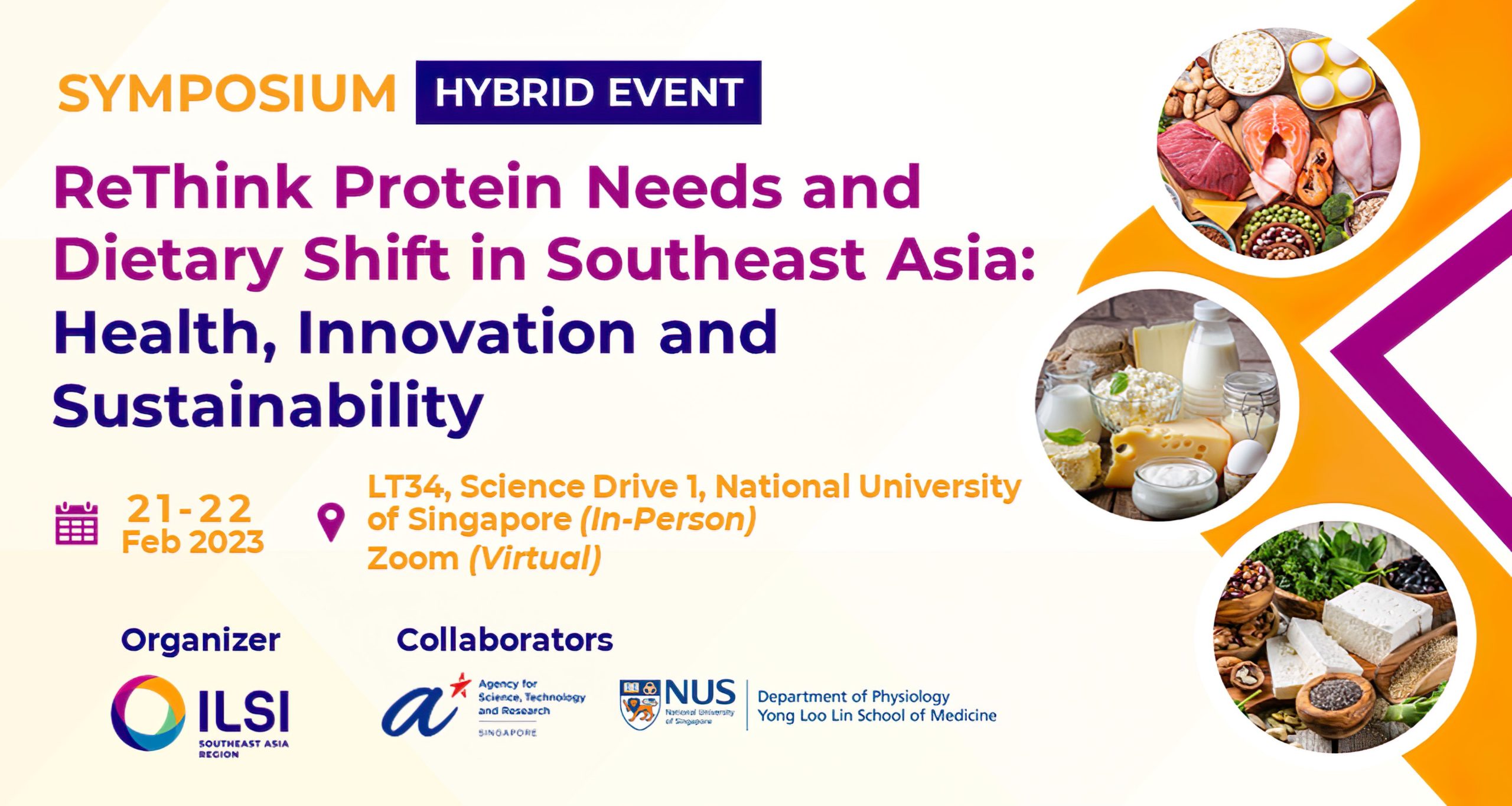 Click Here to Register
Click Here to Register
BACKGROUND
New initiatives and research by government agencies, academia, agri-technology and food sectors are reviewing protein needs in the context of production, health and sustainability. Within Southeast Asia, it is timely to re-assess protein sources, requirements and intakes, and to evaluate protein quality in our varied diets. New knowledge on protein science and novel protein sources will inform dietary recommendations, advance innovation and product development, and help address nutritional and sustainability gaps.
This symposium will bring together subject experts, researchers, health professionals, food scientists, government agencies, industry and product innovators to share and discuss the latest from research to development.
REGISTRATION
This 1.5-day symposium will be hosted in a hybrid format (In-person & virtual).
Registration Rates are as follows:
In-Person
Industry S$220.00
Academia S$150.00
Virtual S$60.00
**Virtual registration is applicable only for participants outside of Singapore.
Registration is open until February 16, 2023, 23:59 SGT.
Note: Certificate of attendance is available upon request.
PROGRAM AND SPEAKERS
DAY 1: Tuesday, February 21, 2023
Session 1: ReLook Protein Science, Requirements and Consumption Impacting Nutrition, Health and Sustainability
Expand
Chair: Prof. Reshma Taneja, Department of Physiology, Yong Loo Lin School of Medicine, National University of Singapore
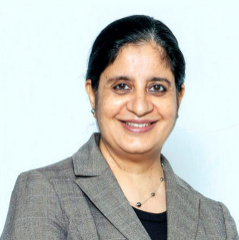 Prof. Reshma Taneja is Head of the Department of Physiology at the National University of Singapore. She obtained her Ph.D. degree from the Indian Institute of Science and completed her postdoctoral training in the laboratory of Prof Pierre Chambon at the IGBMC in France. Her own laboratory, initially at the Mount Sinai School of Medicine in New York City, and now at the National University of Singapore, has a long-standing interest in understanding skeletal muscle biology and its de-regulation in human myopathies. She has published her work in high profile journals and serves on many editorial boards as well as grant review panels locally and internationally. Prof. Reshma has received multiple awards including a Scholar Award from the Leukemia and Lymphoma Society in the USA; as well as Faculty Research, Teaching and Mentoring Awards in Singapore.
Prof. Reshma Taneja is Head of the Department of Physiology at the National University of Singapore. She obtained her Ph.D. degree from the Indian Institute of Science and completed her postdoctoral training in the laboratory of Prof Pierre Chambon at the IGBMC in France. Her own laboratory, initially at the Mount Sinai School of Medicine in New York City, and now at the National University of Singapore, has a long-standing interest in understanding skeletal muscle biology and its de-regulation in human myopathies. She has published her work in high profile journals and serves on many editorial boards as well as grant review panels locally and internationally. Prof. Reshma has received multiple awards including a Scholar Award from the Leukemia and Lymphoma Society in the USA; as well as Faculty Research, Teaching and Mentoring Awards in Singapore.
Co-chair: Mr. Geoffry Smith, ILSI SEA Region
 Mr. Geoffry Smith is President of ILSI Southeast Asia Region based in Singapore, and a Representative of the branch to the ILSI Global Assembly. He is also the Chairman of the Essential Micronutrients Foundation, a non-profit organization which addresses micronutrient deficiencies globally as a public health issue. In addition, he is Director of Nutrition Strategies International which deals with food and nutrition issues in developing countries. Mr. Smith serves as a member of the editorial board of the journal Food and Nutrition Bulletin. Prior to his current positions, Mr. Smith was the Global Director, Health Chelates for Akzo Nobel Functional Chemicals, and directed the global business for these compounds in food and nutrition as well as pharmaceutical applications. He was responsible for the global project within Akzo Nobel addressing iron deficiency anemia.
Mr. Geoffry Smith is President of ILSI Southeast Asia Region based in Singapore, and a Representative of the branch to the ILSI Global Assembly. He is also the Chairman of the Essential Micronutrients Foundation, a non-profit organization which addresses micronutrient deficiencies globally as a public health issue. In addition, he is Director of Nutrition Strategies International which deals with food and nutrition issues in developing countries. Mr. Smith serves as a member of the editorial board of the journal Food and Nutrition Bulletin. Prior to his current positions, Mr. Smith was the Global Director, Health Chelates for Akzo Nobel Functional Chemicals, and directed the global business for these compounds in food and nutrition as well as pharmaceutical applications. He was responsible for the global project within Akzo Nobel addressing iron deficiency anemia.
Dietary Proteins in Human Nutrition - Recent Advances
Prof. Paul Moughan, Riddet Institute Fellow Laureate, Massey University, New Zealand

Prof. Paul Moughan was appointed to the foundation chair in monogastric biology at Massey University in 1993 and from 1997-2003 was Foundation Head, Institute of Food, Nutrition and Human Health, Massey University. From 2003 until 2017 he held the position of Foundation Co-Director of the Riddet Institute, a National Centre of Research Excellence in Food Science and Human Nutrition. Prof Moughan currently holds the position of Distinguished Professor at Massey University and Riddet Institute Fellow Laureate. His research has encompassed human and animal nutrition, food chemistry, functional foods, digestive physiology and sustainable food production. He has published more than 450 scientific works. In 1995 he was awarded Doctor of Science and in 1997 was awarded a Personal Chair at Massey University and was elected a Fellow of the Royal Society of New Zealand. In 2011 he was appointed Chair of the FAO Expert Consultation to review recommendations on the characterization of dietary protein quality in humans, and has been a frequent contributor to FAO and WHO expert Committees. He has received numerous prestigious international awards for his work, including the New Zealand Prime Minister's Science Prize in 2012, the Honorary Doctor of Science from the University of Guelph, Canada in 2014, and the Wageningen University Medal of Honour in 2018. Prof Moughan sits on a number of editorial boards for scientific journals and is an adviser to the international food industry. Since 2015, he has been invited to contribute to several projects and authorships of the International Academies Partnership (IAP), including a regional IAP policy briefing for the UN Food Systems Summit.
Food Protein - Evaluating Current Supply, Consumption and Intake Guidance for Gap Identification in SE Asia
Prof. Cecilia Acuin, Associate Professor, Institute of Human Nutrition and Food, University of the Philippines Los Baños, the Philippines
 Prof. Cecilia Acuin is an Associate Professor at the Institute of Human Nutrition and Food, University of the Philippines, Los Baños and served as Senior Scientist, lead for Human Nutrition, at the International Rice Research Institute (IRRI), Philippines until May 2020.
Prof. Cecilia Acuin is an Associate Professor at the Institute of Human Nutrition and Food, University of the Philippines, Los Baños and served as Senior Scientist, lead for Human Nutrition, at the International Rice Research Institute (IRRI), Philippines until May 2020.
Prior to her work at IRRI she was also the Chief Science Research Specialist, Nutritional Assessment & Monitoring Division and Chair, Institutional Ethics Committee at the Food & Nutrition Research Institute (FNRI), Department of Science & Technology, Philippines. In this position, she was responsible for the conduct of the Philippine National Nutrition Surveys, and oversaw nutrition research projects of three Sections: the Nutritional Assessment Section, the Nutritional Statistics and Informatics Section, and the Nutritional Interventions, Evaluation and Policy Section. Her research interests are in the areas of maternal and child health and nutrition, food security, food and health systems and operations research, and risk factors of non-communicable diseases.
Dr. Acuin's involvement in multi-country research initiatives includes the following among many others: as a Member of the International Union of Nutritional Sciences Committee on Nutrition and Anthropology; and as a Consultant and Vice-Chair of the WPRO Regional Advisory Committee on Health Research in the WHO Western Pacific Region. In the Philippines, Dr. Acuin has been the Co-Chair of the Philippine National Health Research System, Research Utilization Committee; Head of the Secretariat of the Universal Health Care (UHC) Study Group; Consultant in various capacities of USAID, UNICEF, World Bank, etc., as well as for academic institutions and local organizations such as the Zuellig Family Foundation among others. She obtained her Ph.D. in Nutrition with minors in Nutritional Epidemiology and Risk Communication from Cornell University, USA.
Session 2: Review and Assess Protein Quality and Dietary Shifts
Expand
Chair: Prof. Reshma Taneja, Department of Physiology,
Yong Loo Lin School of Medicine, National University of Singapore
Co-chair: Mr. Geoffry Smith, ILSI SEA Region
Assessing Protein Quality of Sustainable Food Sources to Improve Nutrition in Asia
Assoc. Prof. Wantanee Kriengsinyos, Associate Professor, Institute of Nutrition, Mahidol University, Thailand
 Dr. Wantanee Kriengsinyos has 20 years of professional experience in clinical nutrition and dietetics. Her current research involves metabolic studies of food products in development of non-communicable diseases (NCDs); body composition and energy expenditure; diet and behavior modification for patients with diet-related chronic diseases; and protein quality and amino-acid metabolism. Over the past 5 years, Dr. Kriengsinyos has also developed experience in nutrition policy and was a part of the team that successfully worked to ban partially-hydrogenated oils in Thailand. She currently leads a promotion project on implementation of healthier food logos to combat NCDs through reduction of sugar, fat, and sodium consumption in the Thai population. Currently, Dr. Kriengsinyos is chair of the Master of Science in Nutrition and Dietetics program at the Institute of Nutrition, Mahidol University. She received a doctorate in Nutritional Sciences at the University of Toronto, Canada, and holds a Registered Dietitian credential from the United States.
Dr. Wantanee Kriengsinyos has 20 years of professional experience in clinical nutrition and dietetics. Her current research involves metabolic studies of food products in development of non-communicable diseases (NCDs); body composition and energy expenditure; diet and behavior modification for patients with diet-related chronic diseases; and protein quality and amino-acid metabolism. Over the past 5 years, Dr. Kriengsinyos has also developed experience in nutrition policy and was a part of the team that successfully worked to ban partially-hydrogenated oils in Thailand. She currently leads a promotion project on implementation of healthier food logos to combat NCDs through reduction of sugar, fat, and sodium consumption in the Thai population. Currently, Dr. Kriengsinyos is chair of the Master of Science in Nutrition and Dietetics program at the Institute of Nutrition, Mahidol University. She received a doctorate in Nutritional Sciences at the University of Toronto, Canada, and holds a Registered Dietitian credential from the United States.
Protein Intake, Requirements, and Dietary Shift in SE Asia - Opportunities and Challenges
Prof. Christiani Jeyakumar Henry, Deputy Executive Director, Singapore Institute of Food and Biotechnology Innovation, A*STAR, Singapore
 Prof. Christiani Jeyakumar Henry is currently the Deputy Executive Director of the Singapore Institute of Food and Biotechnology Innovation (SIFBI) and the director of the Clinical Nutrition Research Centre. He initially trained as a food scientist and subsequently obtained his MSc and PhD in Nutrition from the London School of Hygiene and Tropical Medicine. He was instrumental in the development & launch of the UK's first dedicated Functional Food Centre. Professor Henry has served on several committees including the UK Committee on Medical Aspects of Food & Nutrition Policy (COMA) panel on novel foods, was a board member of the UK Food Standards Agency and was a member of the General Advisory Committee on Science (GACS) of the Food Standard Agency (FSA). He also served as a panel member on the UK Department for International Development (DFID) health and population research committee and was a member of the research panel of the UK Crop post-harvest Technology. He was a Royal Society visiting professor at the Chinese University of Hong Kong & continues to remain a visiting professor at the same university.
Prof. Christiani Jeyakumar Henry is currently the Deputy Executive Director of the Singapore Institute of Food and Biotechnology Innovation (SIFBI) and the director of the Clinical Nutrition Research Centre. He initially trained as a food scientist and subsequently obtained his MSc and PhD in Nutrition from the London School of Hygiene and Tropical Medicine. He was instrumental in the development & launch of the UK's first dedicated Functional Food Centre. Professor Henry has served on several committees including the UK Committee on Medical Aspects of Food & Nutrition Policy (COMA) panel on novel foods, was a board member of the UK Food Standards Agency and was a member of the General Advisory Committee on Science (GACS) of the Food Standard Agency (FSA). He also served as a panel member on the UK Department for International Development (DFID) health and population research committee and was a member of the research panel of the UK Crop post-harvest Technology. He was a Royal Society visiting professor at the Chinese University of Hong Kong & continues to remain a visiting professor at the same university.
Intake of Animal and other Protein Source Foods and the Nutritional Significance on Infants and Young Children in SE Asia (Virtual Presentation)
Dr. Umi Fahmida, Senior Researcher & Program Coordinator, SEAMEO RECFON, Indonesia
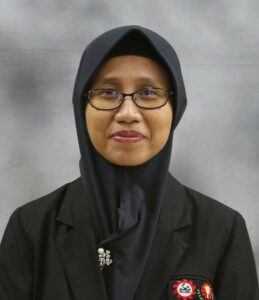 Dr. Umi Fahmida is a Senior Researcher and Program Coordinator of Early Childhood Care, Nutrition, and Education (ECCNE) at Southeast Asian Ministers of Education Organization Regional Centre for Food and Nutrition (SEAMEO RECFON), Universitas Indonesia, Jakarta, Indonesia. She holds Ph.D. in Nutrition and MSc in Community Nutrition from Faculty of Medicine at Universitas Indonesia and Bachelor in Agriculture Technology from Faculty of Agriculture Technology at Bogor Agriculture University. Her research interests are in the nutrient and non-nutrient interaction related to child growth and development. In the past 20 years, she has been working with diet modelling using linear/goal programming (LP) to develop and evaluate food-based recommendations, and to use the identified nutrient gap to develop food multi-mix using locally-available nutrient-dense foods. Under "Model of partnership to translate guidelines into practices for the optimal diet of Southeast Asia community", Dr. Fahmida and her team promoted the LP approach in Indonesia, Cambodia, Lao PDR, Malaysia, Myanmar, and the Philippines for both communities, school and workplace settings. Currently, she is involved in the UK Research and Innovation (UKRI) Global Challenges Research Fund (GCRF) Action Against Stunting Hub, an interdisciplinary multi-centre multi-country study, as Country Lead for Indonesia.
Dr. Umi Fahmida is a Senior Researcher and Program Coordinator of Early Childhood Care, Nutrition, and Education (ECCNE) at Southeast Asian Ministers of Education Organization Regional Centre for Food and Nutrition (SEAMEO RECFON), Universitas Indonesia, Jakarta, Indonesia. She holds Ph.D. in Nutrition and MSc in Community Nutrition from Faculty of Medicine at Universitas Indonesia and Bachelor in Agriculture Technology from Faculty of Agriculture Technology at Bogor Agriculture University. Her research interests are in the nutrient and non-nutrient interaction related to child growth and development. In the past 20 years, she has been working with diet modelling using linear/goal programming (LP) to develop and evaluate food-based recommendations, and to use the identified nutrient gap to develop food multi-mix using locally-available nutrient-dense foods. Under "Model of partnership to translate guidelines into practices for the optimal diet of Southeast Asia community", Dr. Fahmida and her team promoted the LP approach in Indonesia, Cambodia, Lao PDR, Malaysia, Myanmar, and the Philippines for both communities, school and workplace settings. Currently, she is involved in the UK Research and Innovation (UKRI) Global Challenges Research Fund (GCRF) Action Against Stunting Hub, an interdisciplinary multi-centre multi-country study, as Country Lead for Indonesia.
Session 3: Protein and Health - Research and Guidance for Optimal Functional Benefits
Expand
Chair: Prof. David Cameron-Smith, School of Environmental and Life Sciences, University of Newcastle, Australia
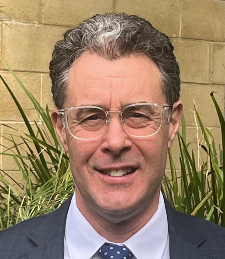 Prof. David Cameron-Smith is currently Professor of Food Innovation and leading the development of a Centre of Food and Agri-business Innovation, University of Newcastle, Australia. Prof Cameron-Smith was appointed to this role in March 2022 after more than 25 years of human nutrition research and strategic science leadership, including serving as Senior Principal Investigator, Singapore Institute of Clinical Sciences (2019-22). His scientific research includes a detailed understanding of how high protein foods and beverages impact human health (including personalised nutrition), ageing malnutrition risk, muscular loss, gut health and mood. This includes leading 19 registered clinical trials and publishing 300+ scientific papers.
Prof. David Cameron-Smith is currently Professor of Food Innovation and leading the development of a Centre of Food and Agri-business Innovation, University of Newcastle, Australia. Prof Cameron-Smith was appointed to this role in March 2022 after more than 25 years of human nutrition research and strategic science leadership, including serving as Senior Principal Investigator, Singapore Institute of Clinical Sciences (2019-22). His scientific research includes a detailed understanding of how high protein foods and beverages impact human health (including personalised nutrition), ageing malnutrition risk, muscular loss, gut health and mood. This includes leading 19 registered clinical trials and publishing 300+ scientific papers.
Co-chair: Mr. Geoffry Smith, ILSI SEA Region
Exercise, Nutrition & Muscle Health (Virtual Presentation)
Prof. Stuart Phillips, Professor, Department of Kinesiology, McMaster University, Canada

Prof. Stuart Phillips is a Tier 1 Canada Research Chair in Skeletal Muscle Health. He is also the Director of the McMaster University Physical Activity Centre of Excellence. Dr. Phillips has authored more than 350 research papers. In 2018-22 he was named to Clarivate's Highly Cited Researchers list as being in the top 1% of all cited researchers in nutrition and physiology research. Dr. Phillips is a fellow of the American College of Sports Medicine and the Canadian Academy of Health Sciences.
Understanding Protein Homeostasis - Improving Protein Metabolism and Reducing Sarcopenia
Prof. Shih-Yin Tsai, Assistant Professor, Department of Physiology, Yong Loo Lin School of Medicine, National University of Singapore
 Assistant Professor Shih-Yin Tsai received her Ph.D. in Dr. Gustavo Leone's lab at the Ohio State University (2009), where she studied the mechanisms by which mammalian E2F transcription factors control cell proliferation. She showed the functional redundancy among E2F activators during development and the specific roles of E2F family members during long-term maintenance. After her Ph.D., she did her postdoctoral training in Dr. Brian Kennedy's lab at the University of Washington and continued her research at the Buck Institute. She investigated the role of mTORC1 downstream translation effecter, 4E-BP1, in regulating metabolic homeostasis during the progression of type II diabetes and aging. Since February 2017, she started her lab as an Assistant Professor at the Department of Physiology at the National University of Singapore. Her study focuses on exploring how protein homeostasis in the regulation of muscle health. Using transgenic mouse models and primary 3D in vitro models of skeletal muscle, her lab studies the aging process at molecular levels to provide an explicit picture of muscle aging for potential therapeutic usage.
Assistant Professor Shih-Yin Tsai received her Ph.D. in Dr. Gustavo Leone's lab at the Ohio State University (2009), where she studied the mechanisms by which mammalian E2F transcription factors control cell proliferation. She showed the functional redundancy among E2F activators during development and the specific roles of E2F family members during long-term maintenance. After her Ph.D., she did her postdoctoral training in Dr. Brian Kennedy's lab at the University of Washington and continued her research at the Buck Institute. She investigated the role of mTORC1 downstream translation effecter, 4E-BP1, in regulating metabolic homeostasis during the progression of type II diabetes and aging. Since February 2017, she started her lab as an Assistant Professor at the Department of Physiology at the National University of Singapore. Her study focuses on exploring how protein homeostasis in the regulation of muscle health. Using transgenic mouse models and primary 3D in vitro models of skeletal muscle, her lab studies the aging process at molecular levels to provide an explicit picture of muscle aging for potential therapeutic usage.
Protein and Bone Health, Micrnutrient Intakes, and Different Protein Sources (Virtual Presentation)
Dr. Kiran Bains, Head, Department of Food and Nutrition, Punjab Agricultural University, India
 Dr. Kiran Bains is presently working as Head, Dept. of Food and Nutrition, PAU, Ludhiana. She has handled 12 adhoc research projects and guided 25 M.Sc. and 9 Ph.D. students. She has worked at Center of Innovative and Applied Bioprocessing (CIAB), Mohali as sabbatical faculty. She has achieved a competitive project funded by Harvest Plus, IFPRI, Washington DC in 2011 on assessment of zinc status of children and women. She has completed three projects funded by World Vegetable Center, Taiwan and a consultancy project funded by UNFPA. She is currently working on a project funded by Nestle India Limited. She has been invited by The World Vegetable Center, Taiwan and Riddet Centre, Massey University New Zealand as visiting fellow in the year 2003 and 2007, respectively. She has represented India at International Workshop to exchange best practices in nutrition awareness programs participated by representatives of 35 countries in 2010 at London, U.K. She had been nominated by government of India to attend Indo New Zealand Workshop on 'Food and Agriculture' at Lincoln University, Christchurch and Massey University, New Zealand in 2011. She has published 125 research papers, 7 book chapters, 14 manual chapters, 5 booklets/pamphlets and 30 popular articles. She has contributed in the development of "Regional adaptation and update of food item based dietary guidelines of National Institute of Nutrition (NIN) with emphasis on cardiovascular diseases. Presently she is convener of Ludhiana chapter of Nutrition Society of India (NSI). Her research activities are mainly focused on micronutrient deficiencies; bioavailability of minerals; energy, protein and iron status of population groups.
Dr. Kiran Bains is presently working as Head, Dept. of Food and Nutrition, PAU, Ludhiana. She has handled 12 adhoc research projects and guided 25 M.Sc. and 9 Ph.D. students. She has worked at Center of Innovative and Applied Bioprocessing (CIAB), Mohali as sabbatical faculty. She has achieved a competitive project funded by Harvest Plus, IFPRI, Washington DC in 2011 on assessment of zinc status of children and women. She has completed three projects funded by World Vegetable Center, Taiwan and a consultancy project funded by UNFPA. She is currently working on a project funded by Nestle India Limited. She has been invited by The World Vegetable Center, Taiwan and Riddet Centre, Massey University New Zealand as visiting fellow in the year 2003 and 2007, respectively. She has represented India at International Workshop to exchange best practices in nutrition awareness programs participated by representatives of 35 countries in 2010 at London, U.K. She had been nominated by government of India to attend Indo New Zealand Workshop on 'Food and Agriculture' at Lincoln University, Christchurch and Massey University, New Zealand in 2011. She has published 125 research papers, 7 book chapters, 14 manual chapters, 5 booklets/pamphlets and 30 popular articles. She has contributed in the development of "Regional adaptation and update of food item based dietary guidelines of National Institute of Nutrition (NIN) with emphasis on cardiovascular diseases. Presently she is convener of Ludhiana chapter of Nutrition Society of India (NSI). Her research activities are mainly focused on micronutrient deficiencies; bioavailability of minerals; energy, protein and iron status of population groups.
Protein & Amino Acids - Optimizing Immunity (Virtual Presentation)
Prof. Philip Calder, Professor, Nutritional Immunology, & Head, School of Human Development & Health, University of Southampton, United Kingdom

Prof. Philip Calder is Professor of Nutritional Immunology and Head of the School of Human Development and Health, Faculty of Medicine, University of Southampton, United Kingdom. He obtained his PhD in Biochemistry in 1987 and spent 8 years at the University of Oxford, before his appointment at the University of Southampton in 1995. Prof Calder is an internationally recognised researcher on a) nutritional immunology, and b) metabolism and functionality of fatty acids with an emphasis on the roles of omega-3 fatty acids. He has received many awards and prizes for his work including the Normann Medal (German Society of Fat Science; 2009), the Ralph Holman Lifetime Achievement Award (American Oil Chemists' Society; 2015), the Danone International Prize for Nutrition (2016), the DSM Lifetime Achievement Prize in Human Nutrition (2017) and the European Lipid Science Award (2021). Prof Calder was President of the International Society for the Study of Fatty Acids and Lipids (2009-2012), Chair of the Scientific Committee of the European Society for Clinical Nutrition and Metabolism (2012-2016), President of the Nutrition Society (2016-2019), and President of ILSI Europe (2019-2021). He was also the Editor-in-Chief of the British Journal of Nutrition (2006- 2013) and is now the Associate Editor of Clinical Science, Journal of Nutrition and Annals of Nutrition and Metabolism. He is currently President of the Federation of European Nutrition Societies.
Protein and Musculoskeletal Health over the Life Course
Prof. Andrea Maier, Co-Director, Centre for Healthy Longevity, Yong Loo Lin School of Medicine, National University of Singapore
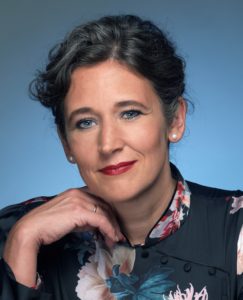
Prof. Andrea Maier (1978), a Fellow of the Royal Australasian College of Physicians (FRACP), graduated in Medicine (MD) 2003 from the University of Lübeck (Germany), was registered 2009 in The Netherlands as Specialist in Internal Medicine-Geriatrics and was appointed Full Professor of Gerontology at Vrije Universiteit Amsterdam (The Netherlands) in 2013. She was the head of Geriatrics at the Vrije Universiteit Medical Center from 2012 to 2016. From 2016 to early 2021 Professor Maier served as Divisional Director of Medicine and Community Care at the Royal Melbourne Hospital, Australia, and as Professor of Medicine and Aged Care at the University of Melbourne, Australia. She continued her career at the National University of Singapore as Co-Director of the Centre for Healthy Longevity. Professor Maier's research focuses on unraveling the mechanisms of ageing and age-related diseases. She is heading international longitudinal cohort studies and geroscience interventions. During the last 12 years she has published more than 370 peer-reviewed articles, achieving an H index of 68, spearheading the significant contributions of her highly acclaimed innovative, global, multidisciplinary @Age research group. She is a frequent guest on radio and television programs to disseminate aging research and an invited member of several international academic and health policy committees, including the WHO. She is the past President of The Australian and New Zealand Society for Sarcopenia and Frailty Research, the Founding President of the Healthy Longevity Medicine Society and serves as selected Member of The Royal Holland Society of Sciences and Humanities.
DAY 2: Wednesday, February 22, 2023
Session 4: Future of Protein - Technologies and Value Proposition of Alternative and Complementary Sources
Expand
Chair: Prof. Zhou Weibiao, Department of Food Science and Technology, National University of Singapore
 Prof. Weibiao Zhou is the foundation Head of the Department of Food Science and Technology and the inaugural Cheng Tsang Man Chair Professor in Food Science and Technology, National University of Singapore (NUS). Trained originally in chemical engineering, he has been working as a food scientist for over 30 years in multiple countries including Australia, China, France, Spain and USA. Among his many professional appointments and honours are: Elected Fellow of Singapore National Academy of Science (SNAS), International Academy of Food Science and Technology (IAFoST), Australian Institute of Food Science and Technology (AIFST), Royal Society of Chemistry (RSC), the UK, Singapore Institute of Food Science and Technology (SIFST); Chair, Advisory Committee on Evaluation of Health Claims, Singapore Food Agency (SFA); Editor for Food Control (published by Elsevier) and Associate Editor for npj Science of Food (published by Nature).
Prof. Weibiao Zhou is the foundation Head of the Department of Food Science and Technology and the inaugural Cheng Tsang Man Chair Professor in Food Science and Technology, National University of Singapore (NUS). Trained originally in chemical engineering, he has been working as a food scientist for over 30 years in multiple countries including Australia, China, France, Spain and USA. Among his many professional appointments and honours are: Elected Fellow of Singapore National Academy of Science (SNAS), International Academy of Food Science and Technology (IAFoST), Australian Institute of Food Science and Technology (AIFST), Royal Society of Chemistry (RSC), the UK, Singapore Institute of Food Science and Technology (SIFST); Chair, Advisory Committee on Evaluation of Health Claims, Singapore Food Agency (SFA); Editor for Food Control (published by Elsevier) and Associate Editor for npj Science of Food (published by Nature).
Co-chair: Dr. Andrew Wan, Singapore Institute of Food and Biotechnology Innovation, A*STAR, Singapore
 Dr. Andrew Wan is Principal Investigator at the Singapore Institute of Food and Biotechnology Innovation (SIFBI), where his research is focussed on the engineering of plant-based and cultured meat. His team's current research is built on their previous innovative work in 3D-cell culture and tissue engineering, which has been published in top tier journals such as Nature Communications and Nature Nanotechnology. He has been invited to speak at various international meetings, such as the International Symposium on Cultured Meat and International Society of Materials for Regenerative Medicine (ISOMRM) meetings. Prior to joining SIFBI, Dr Wan was Principal Research Scientist at the Institute of Bioengineering and Nanotechnology (2004-2021). He held an adjunct position at the Department of Chemistry, NUS, from 2006 to 2011 and served on the Editorial board of the journal Nanomedicine: Nanotechnology, Biology, and Medicine from 2009-2016. He has served as a panel expert at MOE, Singapore, and was selected to join its delegation to ISEF 2016 as Grand Award Judge. Based on his achievements, he was listed amongst the top 2% of scientists in Bioengineering (2020 Stanford study).
Dr. Andrew Wan is Principal Investigator at the Singapore Institute of Food and Biotechnology Innovation (SIFBI), where his research is focussed on the engineering of plant-based and cultured meat. His team's current research is built on their previous innovative work in 3D-cell culture and tissue engineering, which has been published in top tier journals such as Nature Communications and Nature Nanotechnology. He has been invited to speak at various international meetings, such as the International Symposium on Cultured Meat and International Society of Materials for Regenerative Medicine (ISOMRM) meetings. Prior to joining SIFBI, Dr Wan was Principal Research Scientist at the Institute of Bioengineering and Nanotechnology (2004-2021). He held an adjunct position at the Department of Chemistry, NUS, from 2006 to 2011 and served on the Editorial board of the journal Nanomedicine: Nanotechnology, Biology, and Medicine from 2009-2016. He has served as a panel expert at MOE, Singapore, and was selected to join its delegation to ISEF 2016 as Grand Award Judge. Based on his achievements, he was listed amongst the top 2% of scientists in Bioengineering (2020 Stanford study).
Proteomics Applied to Novel Protein Sources -Risks and Benefits (Virtual Presentation)
Prof. Michelle Colgrave, Deputy Director, CSIRO Agriculture and Food, Australia
 Prof. Michelle Colgrave is the Deputy Director (Impact) for CSIRO Agriculture and Food, based in Brisbane, Australia. She is a Professor of Food and Agricultural Proteomics, and chief investigator on the Australian Research Council Centre of Excellence for Innovations in Peptide and Protein Science. Her research interests include the application of proteomics, the study of proteins using mass spectrometry, to agriculture and food science to the benefit of human health. Professor Michelle Colgrave led CSIRO's Future Protein Mission, a program centred on principles of sustainable growth delivering high quality, affordable and nutritionally optimised protein for Australia. The mission will develop protein-based industries (including traditional protein, plant-based protein, insect and microbial protein) along the value chain from production to the customer, delivering premium protein ingredients and products, addressing the rapid growth of the protein-based sector.
Prof. Michelle Colgrave is the Deputy Director (Impact) for CSIRO Agriculture and Food, based in Brisbane, Australia. She is a Professor of Food and Agricultural Proteomics, and chief investigator on the Australian Research Council Centre of Excellence for Innovations in Peptide and Protein Science. Her research interests include the application of proteomics, the study of proteins using mass spectrometry, to agriculture and food science to the benefit of human health. Professor Michelle Colgrave led CSIRO's Future Protein Mission, a program centred on principles of sustainable growth delivering high quality, affordable and nutritionally optimised protein for Australia. The mission will develop protein-based industries (including traditional protein, plant-based protein, insect and microbial protein) along the value chain from production to the customer, delivering premium protein ingredients and products, addressing the rapid growth of the protein-based sector.
Prof Colgrave is internationally recognised for the development and application of MS techniques for the quantification of gluten (e.g., hordeins in barley; gliadins and glutenins in wheat). The success of this research has been recognized by receipt of the Bowie Medal (ANZSMS), the ICM Agrifood Award (Australian Academy of Technological Sciences and Engineering (ATSE) Innovation and Excellence Awards, 2020), CSIRO Chairman's Medal (2016), and more. Prof. Colgrave received both her B.Sc. and PhD. at the University of Wollongong, Australia. She was recently elected as a Fellow of ATSE for her services to the Agriculture and Food sectors.
Plant-based Meats - Challenges, Market Overview and Available Technologies
Dr.Christian Carrillo, Head, Technology for SEA & Oceania, Bühler Group, Singapore
 Dr. Christian Carrillo is a distinguished leader in the food industry with over a decade of experience driving innovation and sustainability through impactful manufacturing processes. As the Head of Technology for SEA and Oceania at Bühler, he is at the forefront of emerging technologies, leading the development of R&D roadmaps for the Protein Innovation Centre in Singapore. Christian's education began in Switzerland, where he specialized in designing cutting-edge grain processing plants. Since then, he has been stationed in various Bühler offices worldwide, contributing significantly to scaling up Bühler's technology footprint in alternative proteins, with a particular focus on the segment of meat analogue production. As a visionary, Christian is passionate about creating novel solutions to reduce CO2 emissions and drive sustainable practices within the industry. His expertise in designing different food and feed manufacturing processes has been instrumental in Bühler's continued success in providing industrial solutions. Outside of work, Christian is an avid chef, experimenting with new plant-based product recipes and bringing his passion for sustainability to the table. His deep commitment to innovation and sustainability is a testament to his unique vision and leadership in the food industry.
Dr. Christian Carrillo is a distinguished leader in the food industry with over a decade of experience driving innovation and sustainability through impactful manufacturing processes. As the Head of Technology for SEA and Oceania at Bühler, he is at the forefront of emerging technologies, leading the development of R&D roadmaps for the Protein Innovation Centre in Singapore. Christian's education began in Switzerland, where he specialized in designing cutting-edge grain processing plants. Since then, he has been stationed in various Bühler offices worldwide, contributing significantly to scaling up Bühler's technology footprint in alternative proteins, with a particular focus on the segment of meat analogue production. As a visionary, Christian is passionate about creating novel solutions to reduce CO2 emissions and drive sustainable practices within the industry. His expertise in designing different food and feed manufacturing processes has been instrumental in Bühler's continued success in providing industrial solutions. Outside of work, Christian is an avid chef, experimenting with new plant-based product recipes and bringing his passion for sustainability to the table. His deep commitment to innovation and sustainability is a testament to his unique vision and leadership in the food industry.
Bioprocessing for Innovative Alternative Proteins- Cultivated Meat, Fermentation-derived Products & Plant-based Meat
Dr. Deepak Choudhury, Senior Scientist & Group Leader, Biomanufacturing Technology, Bioprocessing Technology Institute, A*STAR, Singapore
 Dr. Deepak Choudhury is currently a Senior Scientist and Group Leader of Biomanufacturing Technology at Bioprocessing Technology Institute (BTI), A*STAR, Singapore. His primary research interests include biomaterials and biofabrication processes for Cellular Ag applications and biomanufacturing biomaterials for regenerative medicine. Dr Choudhury and his team have published numerous unique insights into the Cultivated meat (CM) field - starting with a cover story article on "The business of cultured meat", which catalogued the various CM companies, meat focus for the first time, funding landscape etc. The team wrote two more analyses in 2020 to comprehend the nomenclature and impact of 3D printing in CM space. These were followed up with impactful reviews articulating the state of edible scaffolds, discussions on a developing CM ecosystem as well as the impact of fermentation on this nascent industry in 2021 and 2022, respectively. This also included the very first patentometric analysis of the CM field - Cultured meat-a patentometric analysis. Dr Choudhury has been an active reviewer of technical and review journal articles in the alternative proteins/cultivated meat space, including for Nature Food, NPJ Science of Food, Future Foods, Critical Reviews in Food Science and Nutrition, Trends in Food Science and Technology etc. He was recently selected to be part of the expert technical panel for an Expert Consultation session on "Scientific advice on cell-based food products and food safety considerations", organized by the Food and Agriculture Organization of the United Nations (FAO) in Collaboration with WHO. He is also part of the working group under the European Academies' Science Advisory Council (EASAC) Biosciences Programme on "Meat Alternatives". He is an award recipient of the 1st Alternative Protein Seed Challenge under the Singapore Food Story (SFS) R&D Programme, as well as a Co-Investigator of CentRe of Innovation for Sustainable banking and production of cultivated Meats (CRISP Meats), also funded by SFS.
Dr. Deepak Choudhury is currently a Senior Scientist and Group Leader of Biomanufacturing Technology at Bioprocessing Technology Institute (BTI), A*STAR, Singapore. His primary research interests include biomaterials and biofabrication processes for Cellular Ag applications and biomanufacturing biomaterials for regenerative medicine. Dr Choudhury and his team have published numerous unique insights into the Cultivated meat (CM) field - starting with a cover story article on "The business of cultured meat", which catalogued the various CM companies, meat focus for the first time, funding landscape etc. The team wrote two more analyses in 2020 to comprehend the nomenclature and impact of 3D printing in CM space. These were followed up with impactful reviews articulating the state of edible scaffolds, discussions on a developing CM ecosystem as well as the impact of fermentation on this nascent industry in 2021 and 2022, respectively. This also included the very first patentometric analysis of the CM field - Cultured meat-a patentometric analysis. Dr Choudhury has been an active reviewer of technical and review journal articles in the alternative proteins/cultivated meat space, including for Nature Food, NPJ Science of Food, Future Foods, Critical Reviews in Food Science and Nutrition, Trends in Food Science and Technology etc. He was recently selected to be part of the expert technical panel for an Expert Consultation session on "Scientific advice on cell-based food products and food safety considerations", organized by the Food and Agriculture Organization of the United Nations (FAO) in Collaboration with WHO. He is also part of the working group under the European Academies' Science Advisory Council (EASAC) Biosciences Programme on "Meat Alternatives". He is an award recipient of the 1st Alternative Protein Seed Challenge under the Singapore Food Story (SFS) R&D Programme, as well as a Co-Investigator of CentRe of Innovation for Sustainable banking and production of cultivated Meats (CRISP Meats), also funded by SFS.
Plant and Animal Proteins -Nutritional Profiles and Impact on Sustainability Metrics using Life Cycle Assessment (Virtual Presentation)
Prof. Sarah McLaren, Professor, School of Agriculture and Environment, Massey University, New Zealand
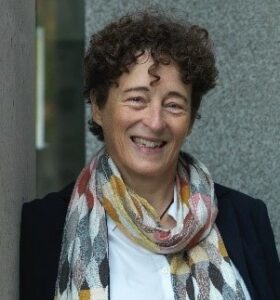 Professor Sarah McLaren is Director of the New Zealand Life Cycle Management Centre (NZLCM Centre), and Professor in Life Cycle Management at Massey University, New Zealand (NZ). Her research focuses on development and application of Life Cycle Assessment (LCA) and related approaches such as planetary boundaries, industrial ecology and the circular economy. Prof McLaren has promoted uptake of Life Cycle Management in New Zealand as a founding Committee member of the Life Cycle Association of New Zealand (LCANZ) and member of the Technical Advisory Group of the Australasian Environmental Product Declaration (EPD) Programme. She has served on the Office of the Prime Minister's Chief Science Advisor's Rethinking Plastics Panel, Ministry for the Environment's Planetary Boundaries NZ Advisory Board, and represented NZ on the ISO Water Footprint Working Group. She works with organisations such as the Food and Agriculture Organisation of the United Nations (FAO), Building Research Association of New Zealand (BRANZ), BEACON Bioeconomy Research Centre Ireland, and the NZ Food Awards to translate Life Cycle Management into practical action.
Professor Sarah McLaren is Director of the New Zealand Life Cycle Management Centre (NZLCM Centre), and Professor in Life Cycle Management at Massey University, New Zealand (NZ). Her research focuses on development and application of Life Cycle Assessment (LCA) and related approaches such as planetary boundaries, industrial ecology and the circular economy. Prof McLaren has promoted uptake of Life Cycle Management in New Zealand as a founding Committee member of the Life Cycle Association of New Zealand (LCANZ) and member of the Technical Advisory Group of the Australasian Environmental Product Declaration (EPD) Programme. She has served on the Office of the Prime Minister's Chief Science Advisor's Rethinking Plastics Panel, Ministry for the Environment's Planetary Boundaries NZ Advisory Board, and represented NZ on the ISO Water Footprint Working Group. She works with organisations such as the Food and Agriculture Organisation of the United Nations (FAO), Building Research Association of New Zealand (BRANZ), BEACON Bioeconomy Research Centre Ireland, and the NZ Food Awards to translate Life Cycle Management into practical action.
Session 5: Innovations to Meet Consumer Acceptance and Regulatory Science Development
Expand
Chair: Dr. Andrew Wan, Singapore Institute of Food and Biotechnology Innovation, A*STAR, Singapore
Co-chair: Dr. Francisco Codoner, ScaleUp Bio Pte Ltd, Singapore
 As CEO of ScaleUp Bio, Dr. Francisco (Paco) Codoñer, is on a mission to bring healthy, safe and nutritious food to as many people as possible in the most sustainable way. Paco was most recently based in Utrecht, the Netherlands, as the senior team leader of the systems biology team for Danone Nutricia Research, the global research and innovation arm of French food giant Danone. He is no stranger to Asia, as Paco has lived and worked in the region from 2019 to 2021 in his capacity as Head of the microbiome centre for Danone Nutricia Research in Singapore. Prior to his first assignment in Asia, Paco served as joint CEO and Chief Scientific Officer (CSO) from 2010 to 2019 for cutting-edge biotech company Lifesequencing based in Valencia, Spain. Earlier in his career, Paco specialized in research and development (R&D) for the microbial field in institutions such as Trinity College Dublin in Ireland, Muenster University in Germany and the AIDS Research Institute in Spain. A Spanish national, Paco holds a Bachelor of Science degree in Molecular Genetics, a Master of Science degree in Molecular Evolutionary Genetics and a PhD in Biology (Molecular Genetics and Bioinformatics) from the University of Valencia. He also holds a Master of Science degree in Bioinformatics from the Universidad Autónoma de Madrid.
As CEO of ScaleUp Bio, Dr. Francisco (Paco) Codoñer, is on a mission to bring healthy, safe and nutritious food to as many people as possible in the most sustainable way. Paco was most recently based in Utrecht, the Netherlands, as the senior team leader of the systems biology team for Danone Nutricia Research, the global research and innovation arm of French food giant Danone. He is no stranger to Asia, as Paco has lived and worked in the region from 2019 to 2021 in his capacity as Head of the microbiome centre for Danone Nutricia Research in Singapore. Prior to his first assignment in Asia, Paco served as joint CEO and Chief Scientific Officer (CSO) from 2010 to 2019 for cutting-edge biotech company Lifesequencing based in Valencia, Spain. Earlier in his career, Paco specialized in research and development (R&D) for the microbial field in institutions such as Trinity College Dublin in Ireland, Muenster University in Germany and the AIDS Research Institute in Spain. A Spanish national, Paco holds a Bachelor of Science degree in Molecular Genetics, a Master of Science degree in Molecular Evolutionary Genetics and a PhD in Biology (Molecular Genetics and Bioinformatics) from the University of Valencia. He also holds a Master of Science degree in Bioinformatics from the Universidad Autónoma de Madrid.
Improving functionality of plant proteins - Opportunities and Challenges
Dr. Shaun Sim, Senior Research Fellow, Singapore Institute of Food and Biotechnology Innovation, A*STAR, Singapore
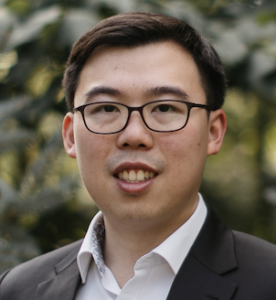 Dr. Shaun Sim is a Senior Research Fellow at A*STAR's Clinical Nutrition Research Centre (CNRC). He received his Ph.D in Food Engineering at Cornell University and his B.A. (Hons.) in Chemistry from the University of Cambridge. Sim is developing innovative food science for constructing future foods and ingredients with nutritional advantages. His team focuses on plant-based proteins and fats; egg and dairy alternatives; high-pressure processing and other novel technologies. Some products developed by his group include high-protein plant-based yoghurts and pastries made using healthier plant-based solid fats.
Dr. Shaun Sim is a Senior Research Fellow at A*STAR's Clinical Nutrition Research Centre (CNRC). He received his Ph.D in Food Engineering at Cornell University and his B.A. (Hons.) in Chemistry from the University of Cambridge. Sim is developing innovative food science for constructing future foods and ingredients with nutritional advantages. His team focuses on plant-based proteins and fats; egg and dairy alternatives; high-pressure processing and other novel technologies. Some products developed by his group include high-protein plant-based yoghurts and pastries made using healthier plant-based solid fats.
Novel Alternative and Complementary Protein Innovations:
Introduction to Multi-Institution Collaborative Project - Protein4Singapore (P4SG)
Dr. Stefan Klade, Director, Research & Innovation, TUMCREATE, Singapore

Dr. Stefan Klade is responsible for efficient and effective research program execution and entrepreneurship support at TUMCREATE and establishes a research platform for the advancements of Singapore's food studies. Since 2022, Dr. Klade coordinates Proteins4Singapore, a comprehensive and collaborative research project on alternative protein production in Singapore. The consortium comprises several international institutions of higher learning and combines the expertise of globally leading food and life scientists.
After training and a position as culinary chef, Dr. Klade studied food chemistry at Technical University of Munich (TUM) in Weihenstephan, Freising. He researched on bitter compounds in coffee beverages with Prof. Thomas Hofmann until 2016 to achieve his doctoral title. Having established project and science management systems at the TUM Chair of Food Chemistry and Molecular Sensory Science, Dr. Klade transitioned to TUM ForTe, Office for Research and Innovation as a Science Manager for Life Sciences in 2020. Since 2023, his careers in culinary arts and food science combine with the experience in project and science management to produce a strong profile for TUMCREATE's research and innovation portfolios.
State of the Art Analysis of Protein Flavors and Scents, Sensomics ', and its Use to Analyze Protein Volatiles and Mitigate Off Flavors
Dr. Florian Utz, Postdoctoral Researcher, School of Life Sciences, Technical University of Munich, Germany
 Dr. Florian Utz received his PhD at the Technical University of Munich (cum laude, supervised by current TUM president Prof. Dr. Thomas Hofmann) and is now Postdoctoral Researcher at the Chair of Food Chemistry and Molecular Sensory Science at the TUM School of Life Sciences, currently led by Professor Corrina Dawid. He has specialized in Molecular Sensory Studies, including the use of advanced ultra-high performance liquid chromatography tandem mass spectrometry (UHPLC-MS/MS), applying this "sensomics" approach to the analysis of volatile and non-volatile compounds in dairy products and in protein isolates, and approaches to mitigate off-flavors. He is a native of Germany and will be collaborating on the "Proteins4Singapore"project in Singapore to discover and develop new protein sources.
Dr. Florian Utz received his PhD at the Technical University of Munich (cum laude, supervised by current TUM president Prof. Dr. Thomas Hofmann) and is now Postdoctoral Researcher at the Chair of Food Chemistry and Molecular Sensory Science at the TUM School of Life Sciences, currently led by Professor Corrina Dawid. He has specialized in Molecular Sensory Studies, including the use of advanced ultra-high performance liquid chromatography tandem mass spectrometry (UHPLC-MS/MS), applying this "sensomics" approach to the analysis of volatile and non-volatile compounds in dairy products and in protein isolates, and approaches to mitigate off-flavors. He is a native of Germany and will be collaborating on the "Proteins4Singapore"project in Singapore to discover and develop new protein sources.
From Lab to Fork: Regulatory & Safety Considerations in Bringing Alternate ("Complementary") Proteins to Market
Dr. Benjamin Smith, Director, Singapore Future Ready Food Safety Hub (FRESH), Singapore Institute of Food and Biotechnology Innovation, A*STAR, Singapore
 Assoc. Prof. Benjamin Smith is Director of the Future Ready Food Safety Hub (a joint initiative between A*STAR, Singapore Food Agency (SFA) and Nanyang Technological University (NTU)) and the Lead for the Human Safety Platform at A*STAR's SIFBI. As a risk assessor and toxicologist who has worked across industry, academia and government, he is a strong proponent of collaborative research and the importance of embedding safety across the entire food chain. His work at A*STAR has seen him involved in the development of 2 ecosystem wide platforms aimed at bringing together Singapore's governmental agencies, the Institutes of Higher Learnings (IHLs) and industry partners to support Singapore's growing food and consumer product industries. His current research interests extend across a range of different areas including gastrointestinal toxicology, dietary intake, risk-benefit frameworks, and the integration of human relevant and socially responsible safety methodologies into the regulatory approval processes for new ingredients and novel foods.
Assoc. Prof. Benjamin Smith is Director of the Future Ready Food Safety Hub (a joint initiative between A*STAR, Singapore Food Agency (SFA) and Nanyang Technological University (NTU)) and the Lead for the Human Safety Platform at A*STAR's SIFBI. As a risk assessor and toxicologist who has worked across industry, academia and government, he is a strong proponent of collaborative research and the importance of embedding safety across the entire food chain. His work at A*STAR has seen him involved in the development of 2 ecosystem wide platforms aimed at bringing together Singapore's governmental agencies, the Institutes of Higher Learnings (IHLs) and industry partners to support Singapore's growing food and consumer product industries. His current research interests extend across a range of different areas including gastrointestinal toxicology, dietary intake, risk-benefit frameworks, and the integration of human relevant and socially responsible safety methodologies into the regulatory approval processes for new ingredients and novel foods.
Download Program
Download Abstracts
E-POSTERS
The following posters were submitted by several academicians and researchers, students, healthcare professionals, government, policy and regulatory authority, and industry innovators, in line with the symposium's session themes. Browse through and download their abstracts and e-posters below.
There will be a dedicated e-poster Q&A session on end of Day 1 (Tuesday, Feb 20, 4.30-5.30pm). Click here to post your questions to the authors.
Session Theme 1: ReLook Protein Science, Requirements and Consumption Impacting Nutrition, Health and Sustainability
S1-1: Environmental Impact and Diet Quality of Derived Dietary Patterns in Vietnam
Son D Nguyen, Sander Biesbroek, Tuyen D Le, Edith J.M Feskens, Inge D Brouwer, Elise F Talsma
Download Abstract
Download E-Poster
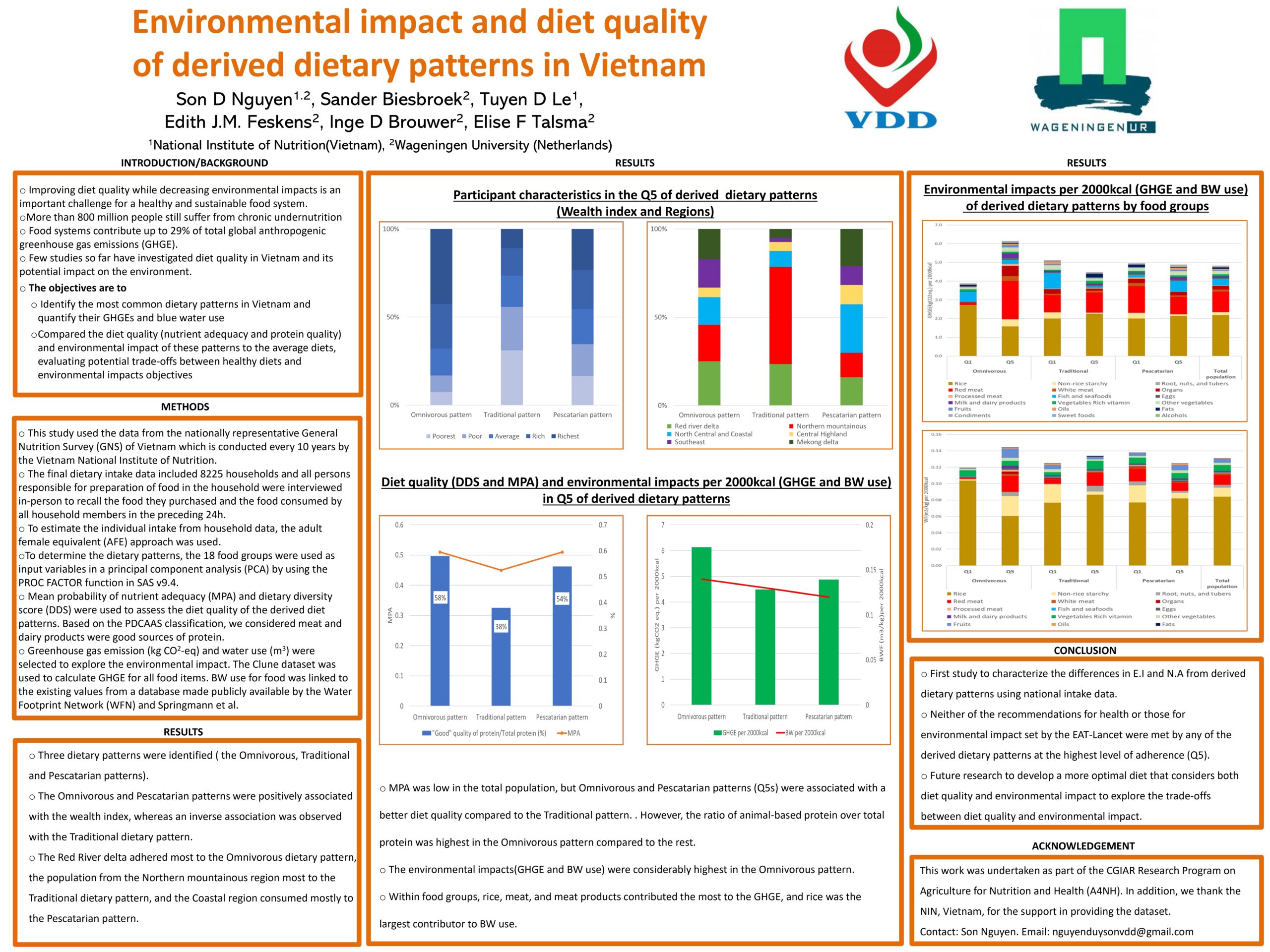
S1-3: Protein and Macronutrient Intakes Among 0.5 - 11.9-year-old Children in Vietnam in 2020
Ha Nguyen Thu, Son Nguyen Duy, Ilse Khouw, Nga Tran Thuy
Download Abstract
Download E-Poster
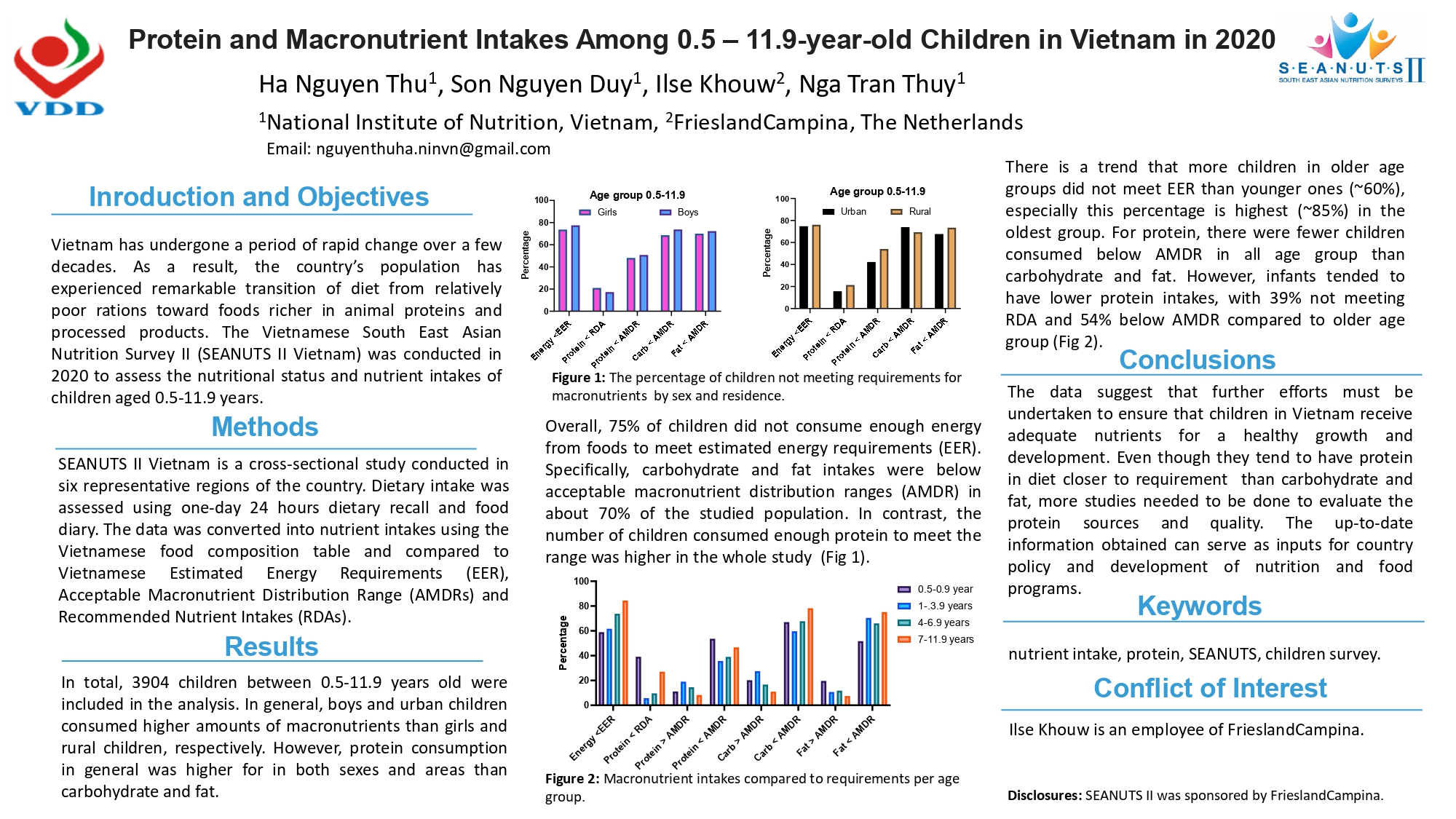
S1-2: Protein Intake and Cardiometabolic Risk Factors among Older Filipino Women
Nanette Mayol, Paulita L. Duazo, Judith B. Borja
Download Abstract
Download E-Poster
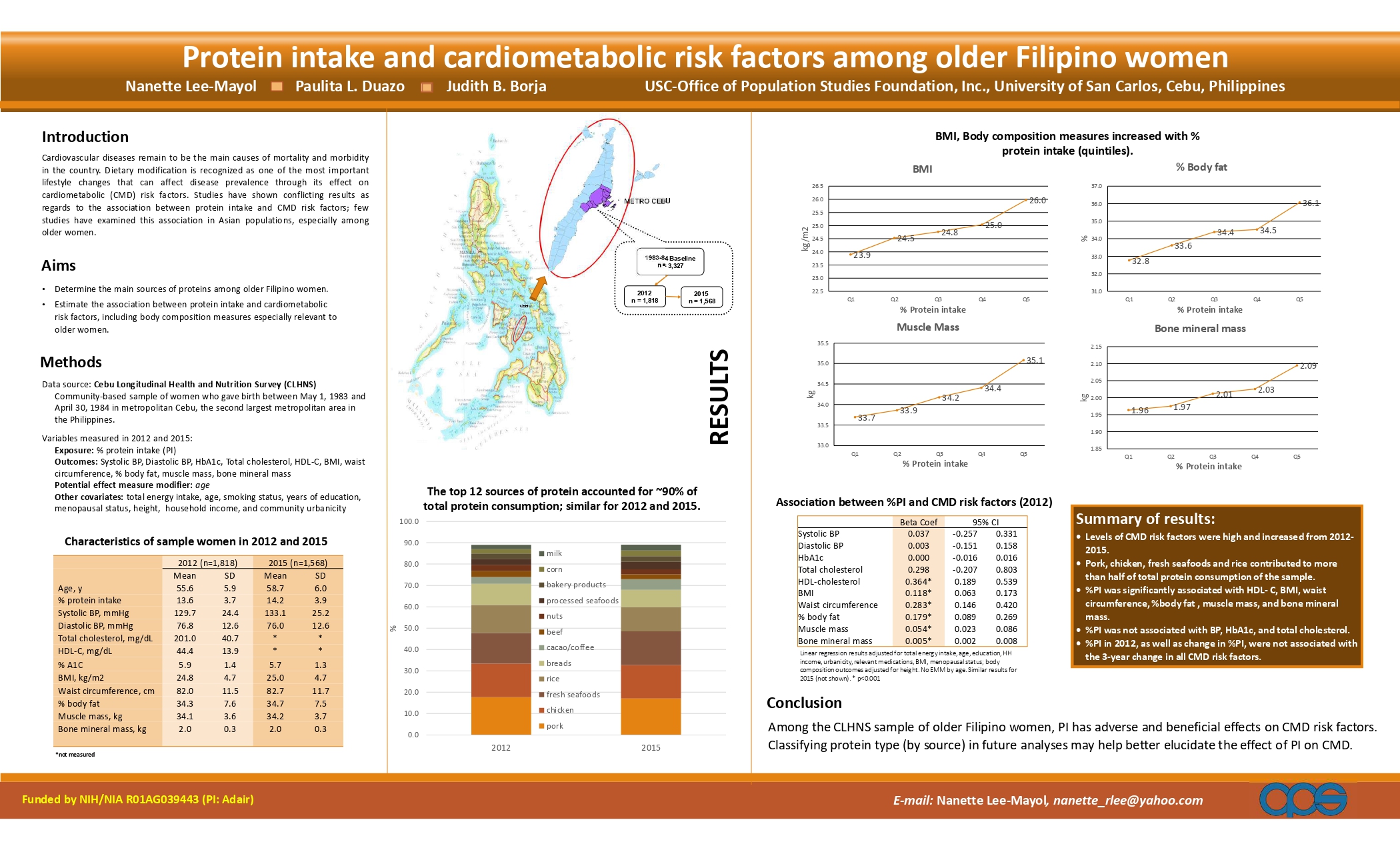
Session Theme 2: Review and Assess Protein Quality and Dietary Shifts
S2-1: Protein Quality of Soy and the Effect of Processing: A quantitative review
Lisa A. van den Berg, Jurriaan J. Mes, Marco Mensink, and Anne J. Wanders
Download Abstract
Download E-Poster
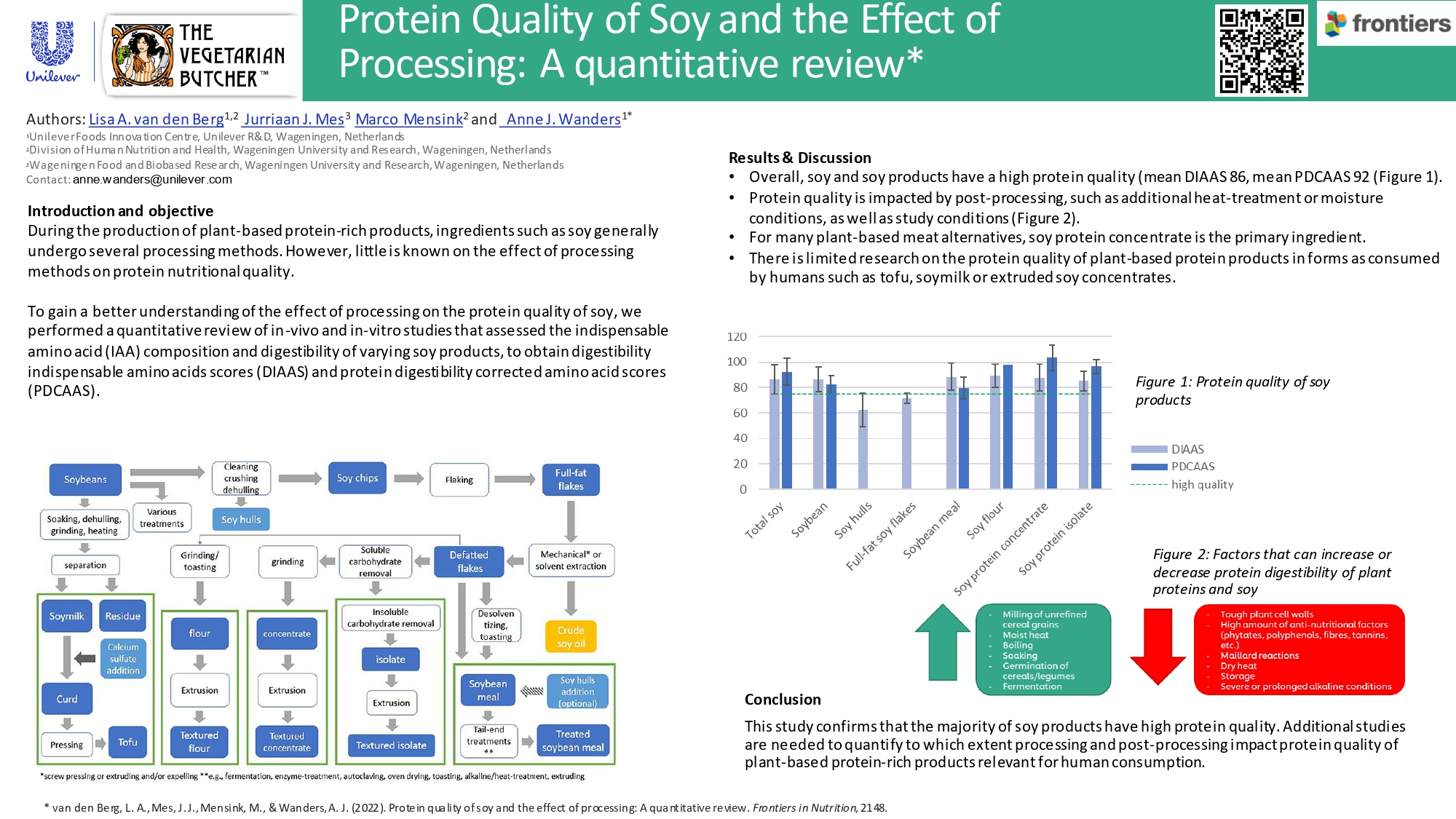
Session Theme 3: Protein and Health - Research and Guidance for Optimal Functional Benefits
S3-1: Association between Dietary Protein Intake and Sleep Quality in Middle-aged and Older Adults in Singapore
Clarinda Nataria Sutanto, LOH Wen Wei, KIM Jung Eun
Download Abstract
Download E-Poster
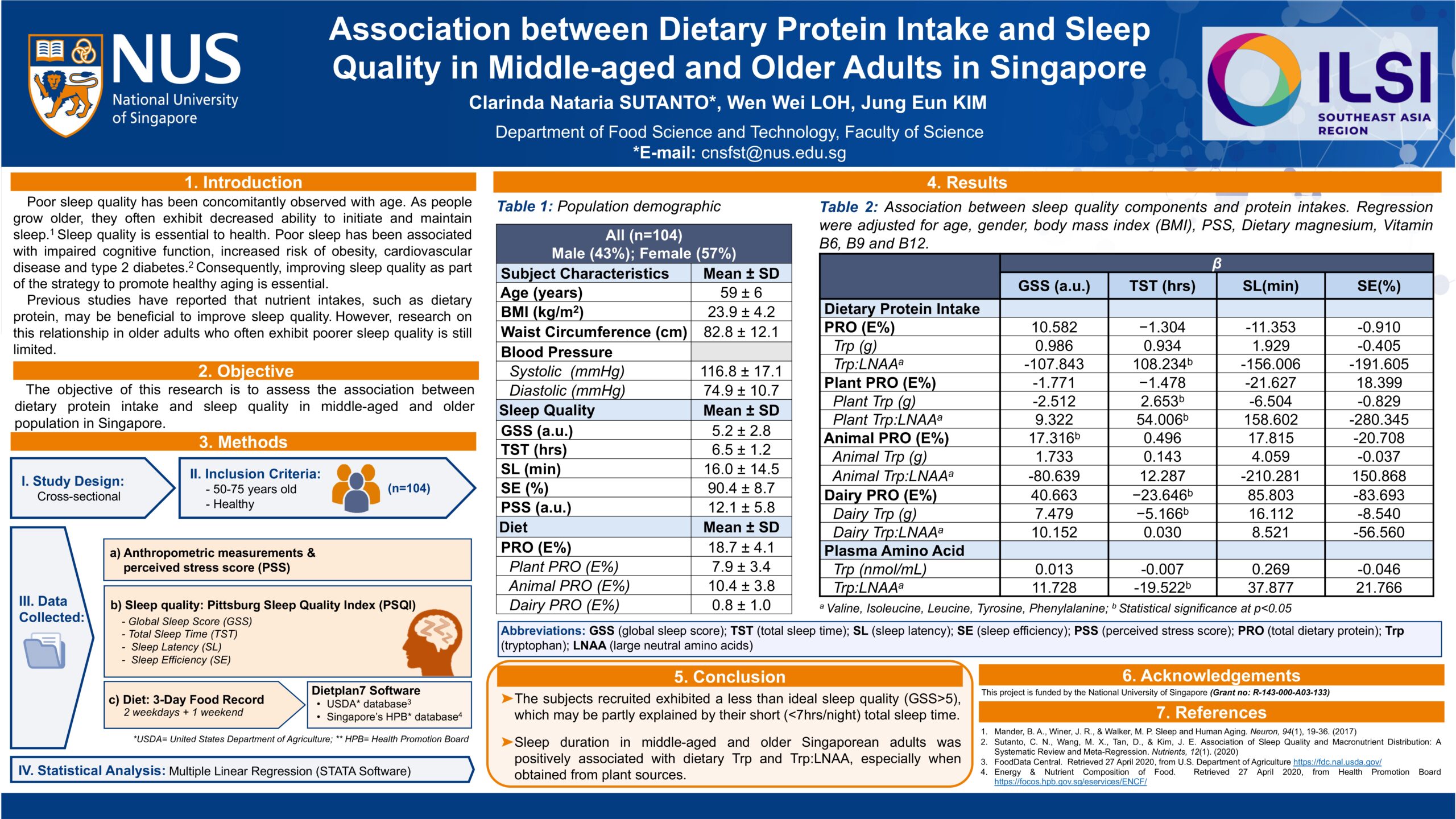
S3-3: Protein Chrononutrition: Time of intake as an additional dimension to optimise dietary protein quality and quantity?
Haldar, Sumanto, Yong, Y.N., Dong, J., Sivappiragasam, P.L., Henry, C.J. and Drum, C.L.
Download Abstract
Download E-Poster
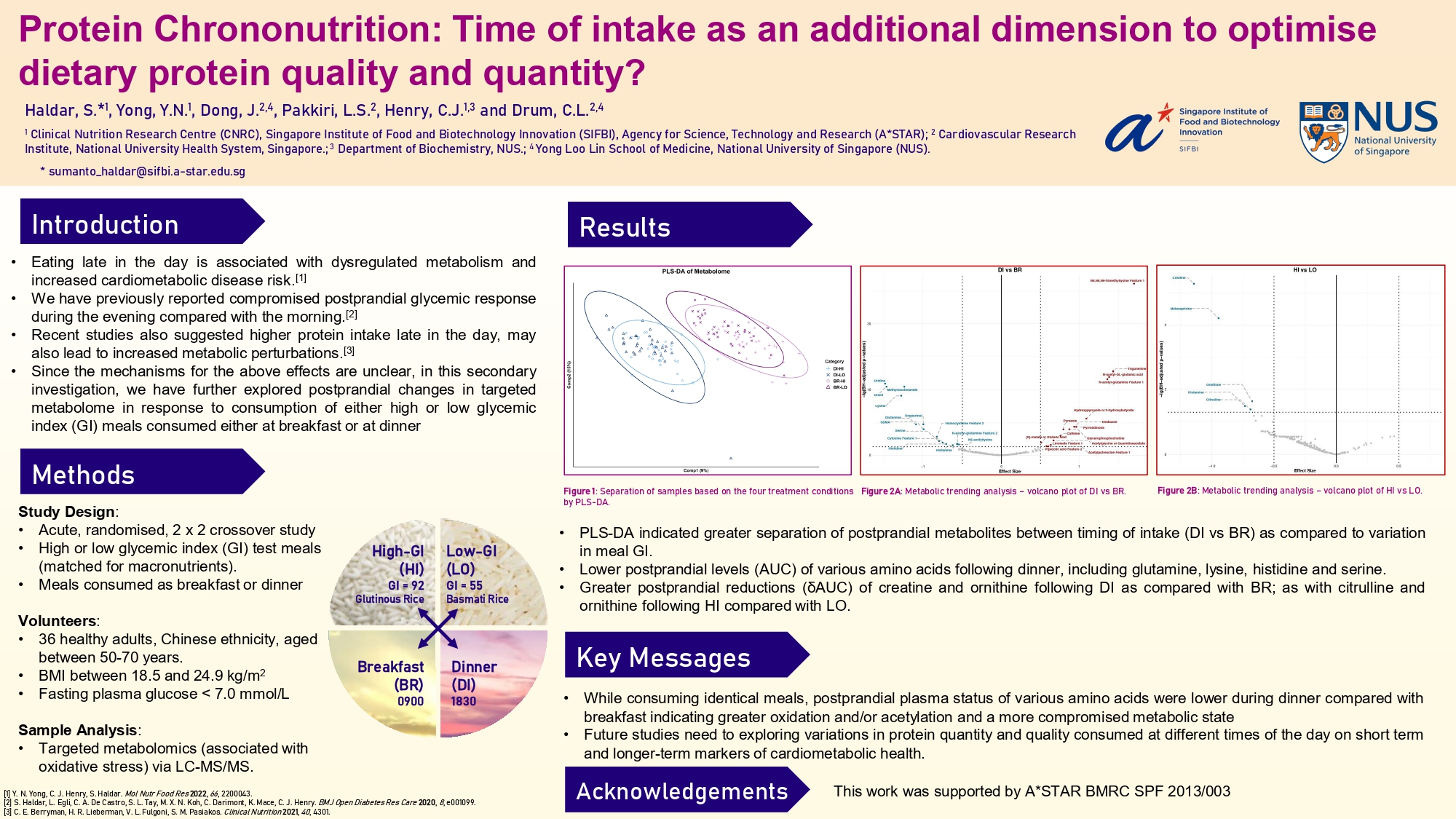
S3-5: The SHIELD Study: Addressing the questions, needs, and challenges of nutritional and muscle health in community-dwelling older adults
Siew Ling Tey (Agnes), D. T. T. Huynh, G. Baggs, Y. L. Low, M. Cheong, C. H. How, W. L. Chow, N. C. Tan, S. T. H. Chew
Download Abstract
Download E-Poster
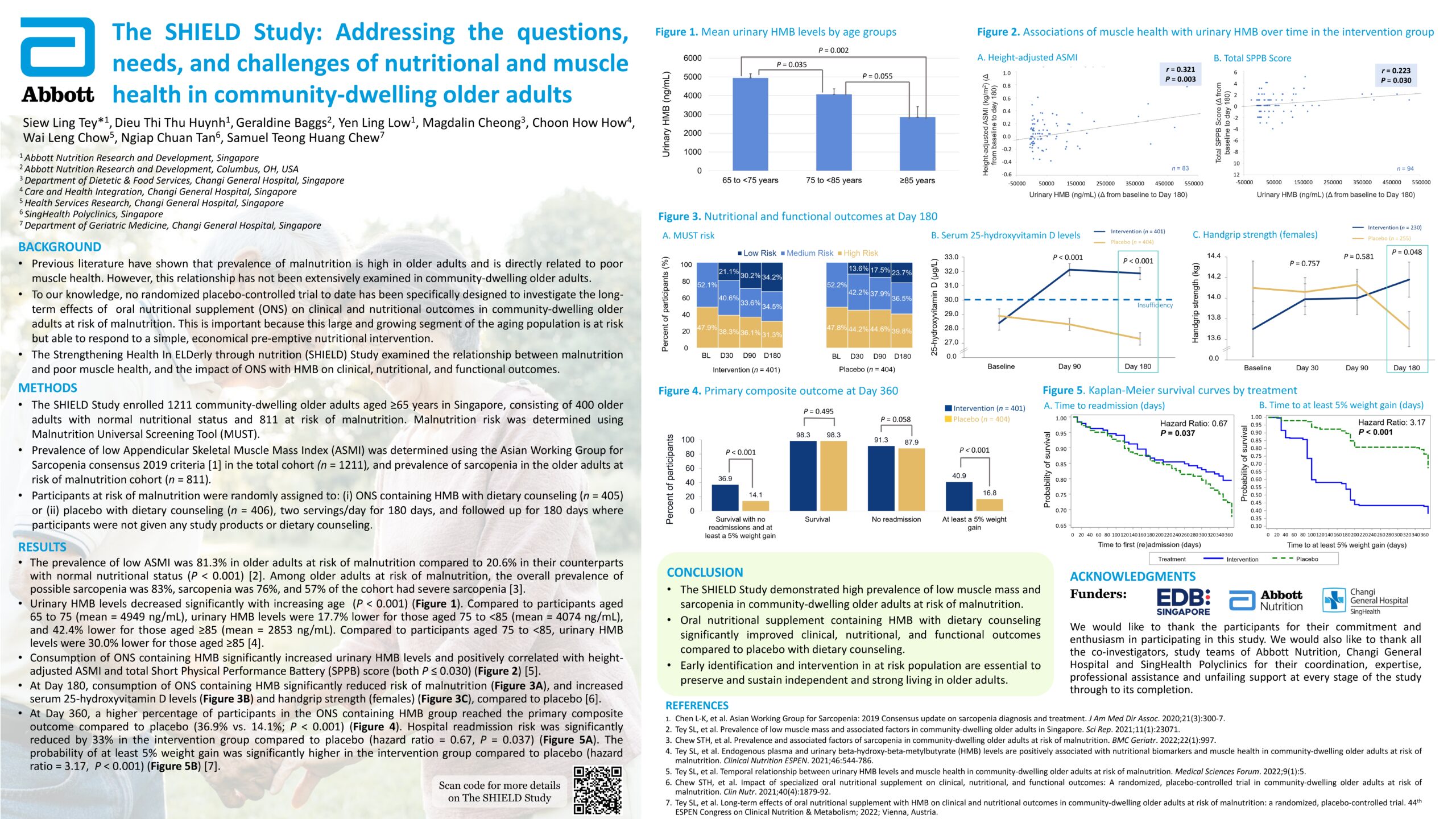
S3-7: Impact of Exercise and Leucine-enriched Protein Supplementation on Physical Function, Body Composition, and Inflammation in Pre-frail Older Adults
Reshma Aziz Merchant, Yiong Huak Chan, Denishkrshna.A, Santhosh Seetharaman, Lydia Au, Vidhya Na-chammai, Alexa Lai, Vanda Ho, Beatrix Ling Ling Wong, Eunice Pang, Kalpana Bhaskaran and Charissa Lim
Download Abstract
Download E-Poster
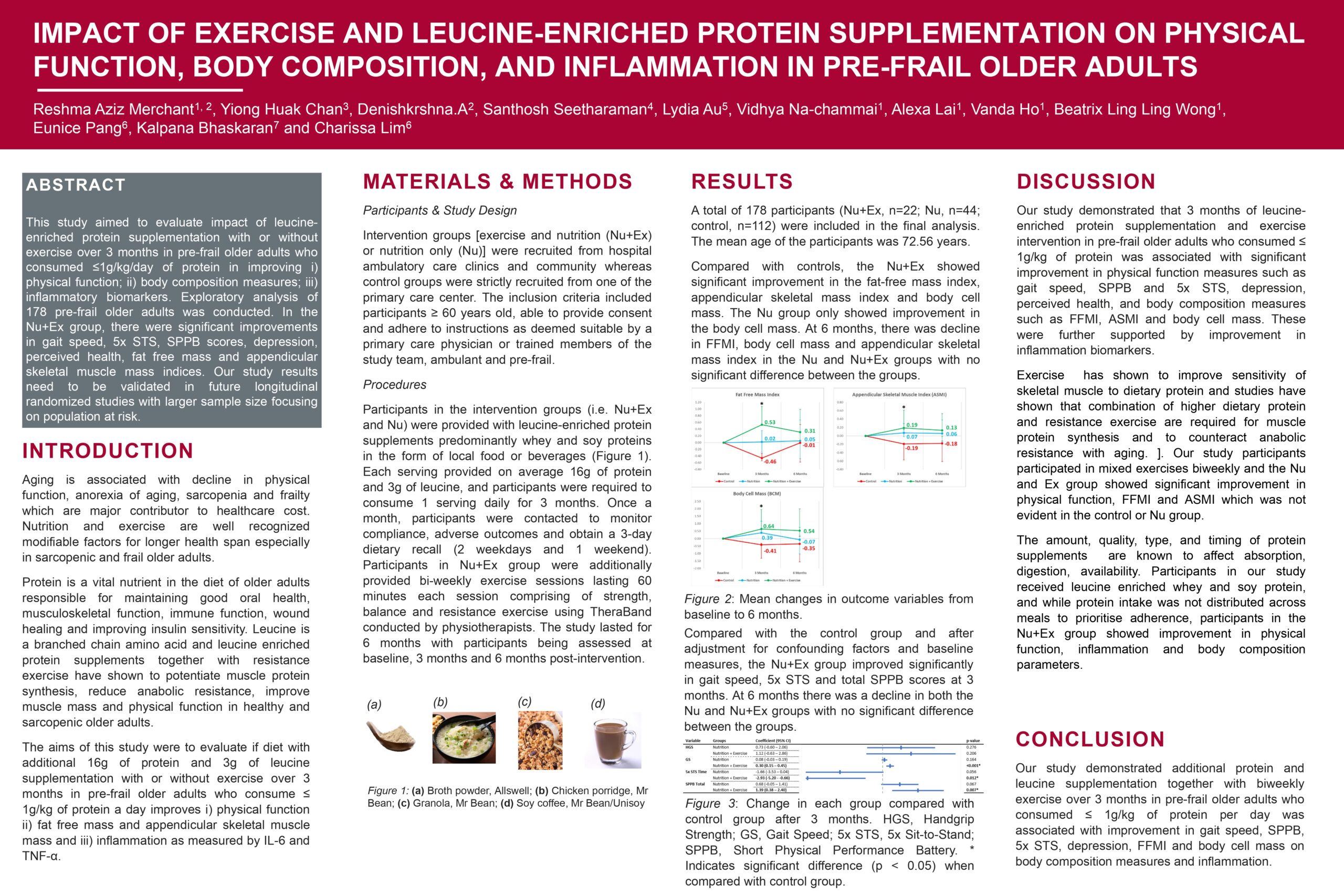
S3-2: Postprandial "Hypo-glycinemia" Following Whey Protein Ingestion in Overweight Women with Impaired Fasting Glucose
Jia Jiet Lim, Ivana Sequeira, Wilson Yip, Louise Lu, David Cameron-Smith, Jennifer Miles-Chana, Sally Poppitt
Download Abstract
Download E-Poster
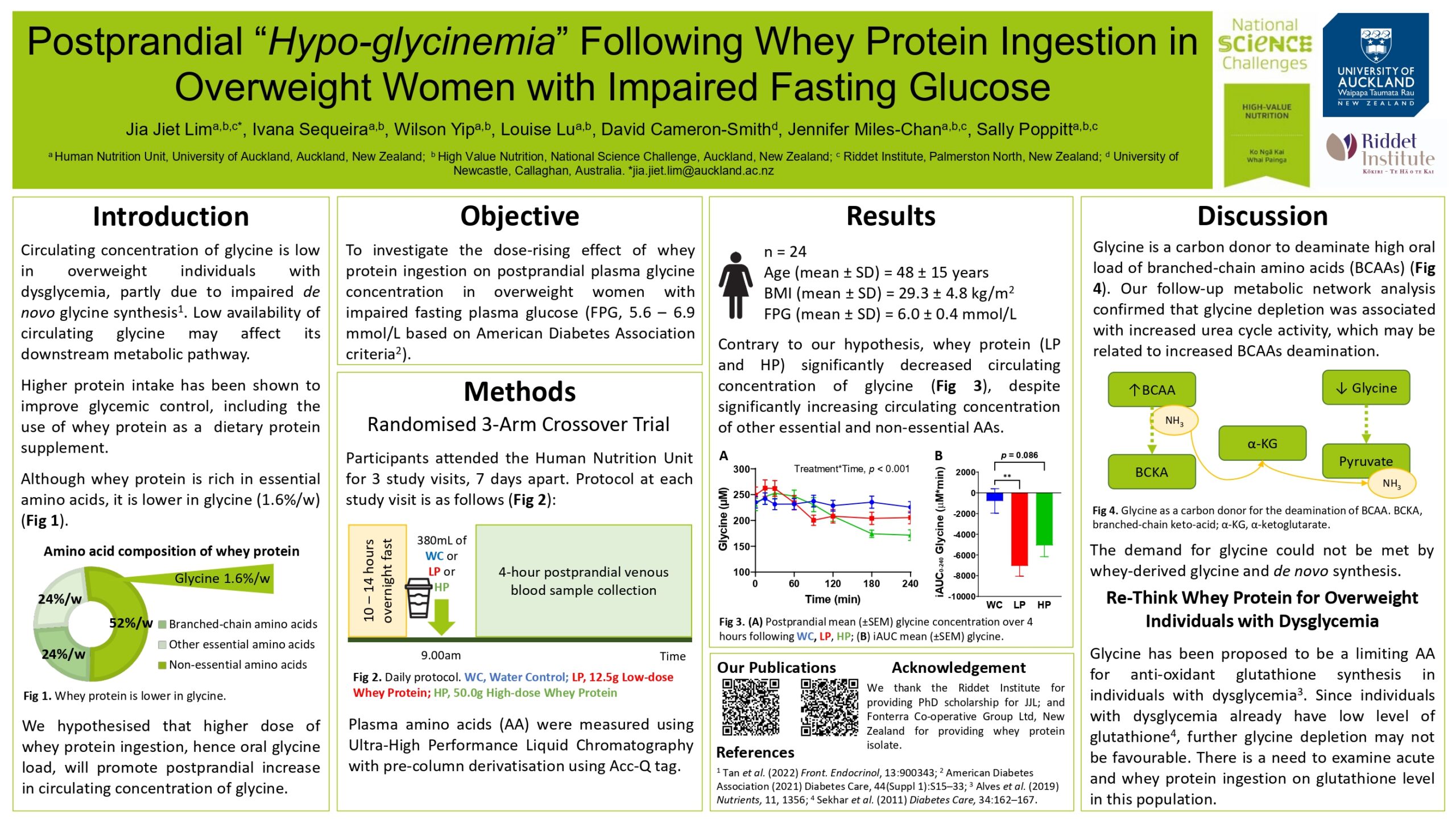
S3-4: Does Consumption of Whole Legumes, as a Source of Plant Proteins, Increase Serum Uric Acid?
Alvin Surya Tjahyo, Sumanto Haldar, Shalini Ponnalagu, Farhana Osman, Shia Lyn Tay, Priya Govindharajulu, Susanna Lim Poh Suan, Kat Long Hui Wong, Christiani Jeyakumar Henry
Download Abstract
Download E-Poster
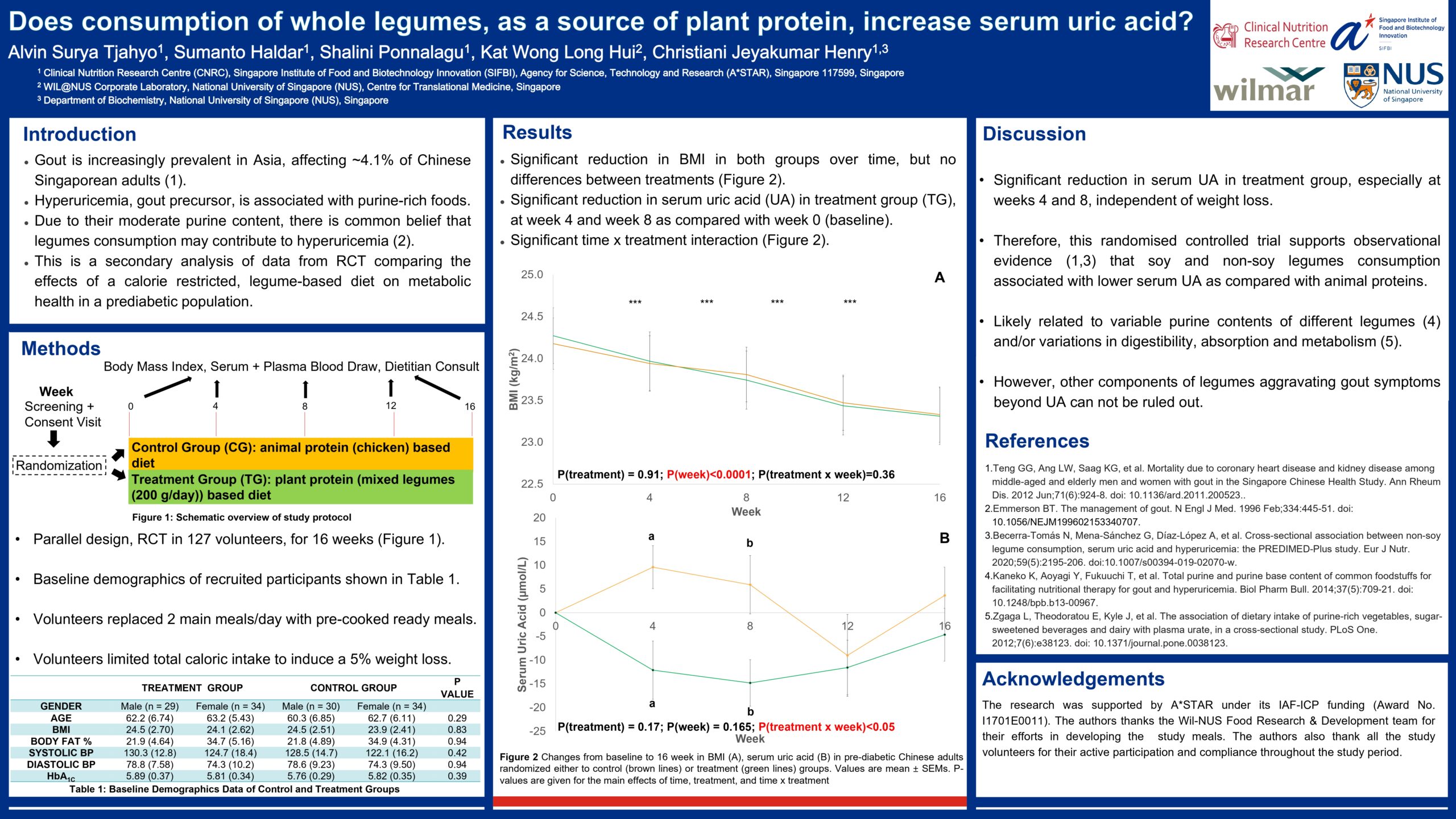
S3-6: Effectiveness of the Nutrition Education Module on the KAP of Stunting among Mothers, MDD and HAZ Z--scores of Children Aged Below 2 years old in Terengganu, Malaysia
Tengku Fatin Nadhirah Te Ku Nor, Bee Suan Wee, Myat Moe Thwe Aung, Marhazlina Mohamad, Mohd Razif Shahril, Aryati Ahmad, Che Suhaili Che Taha, Karimah Fakhriah Ismail
Download Abstract
Download E-Poster
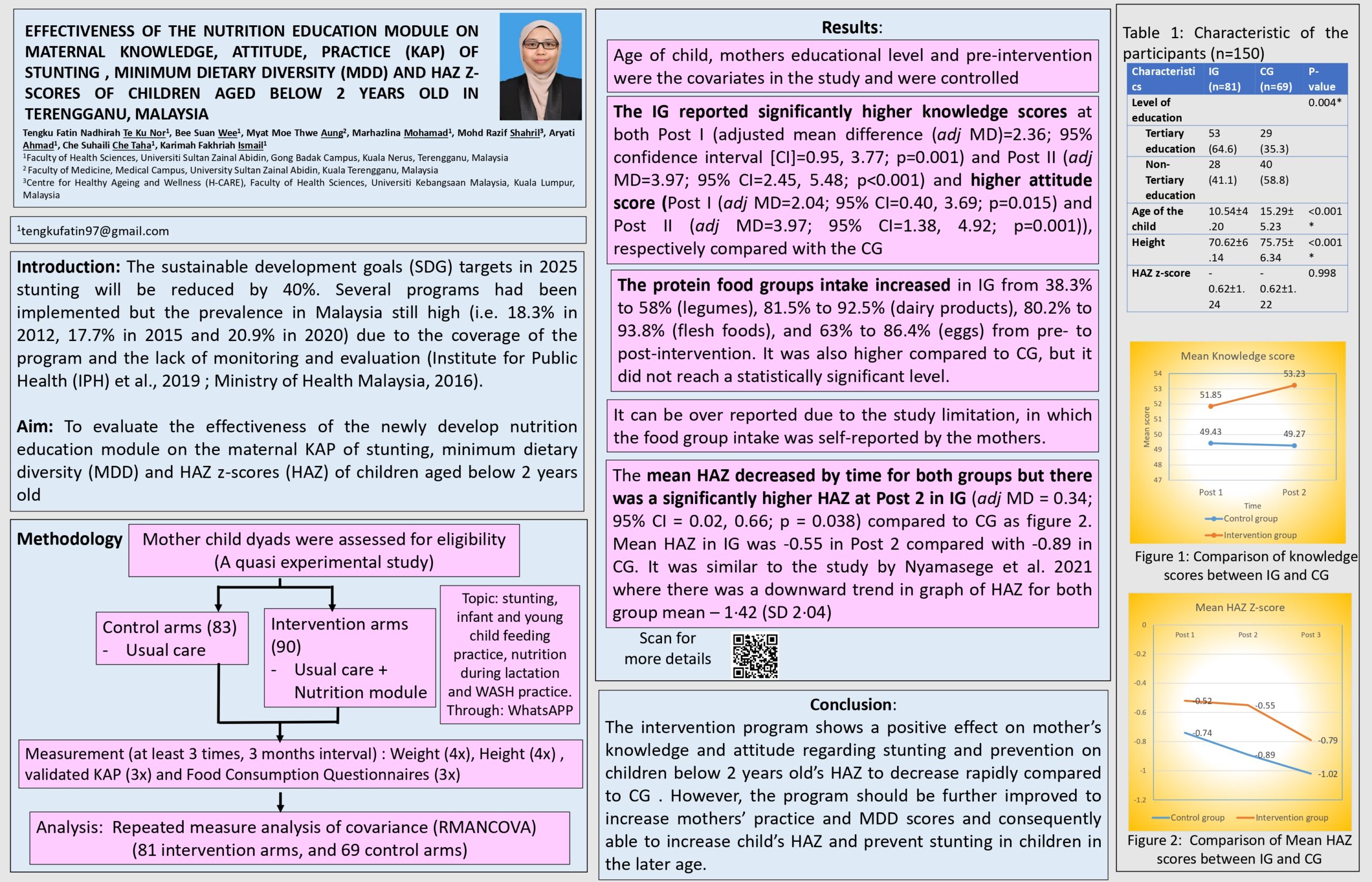
Session Theme 4: Future of Protein - Technologies and Value Proposition of Alternative and Complementary Sources
S4-1: The Development of High Plant-Based Protein Powder Drinks for Weight Management
Kwanchanok Hunthayung, Sassy Bhawamai
Download Abstract
Download E-Poster
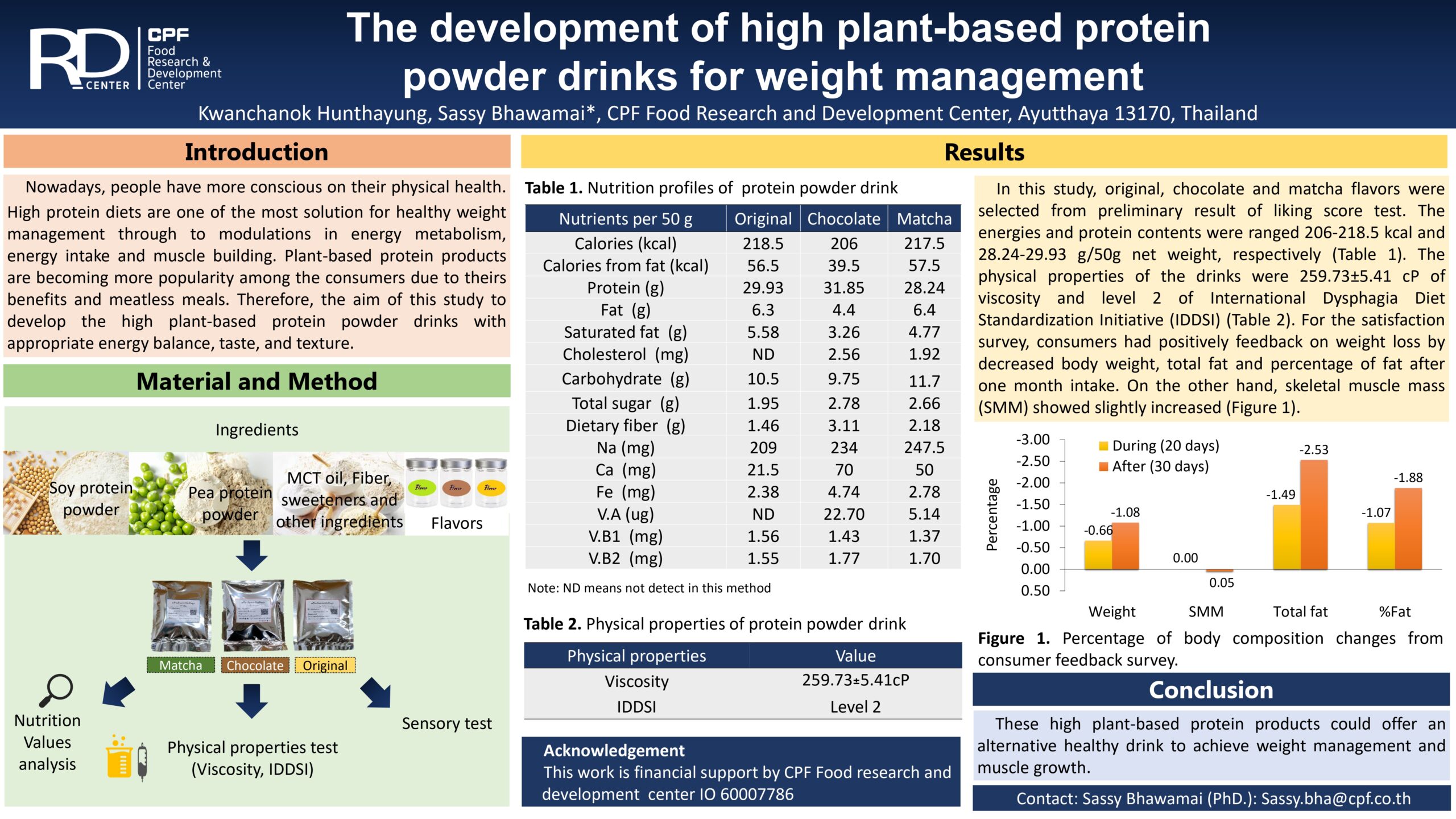
S4-3: Potential Use of Protein Concentrates from Mesoamerican Native Legumes as Ingredients in Plant-Based
Grettel Villalobos-Alpízar, Patricia Esquivel1 Laura Arroyo,Adriana Araya-Morice
Download Abstract
Download E-Poster
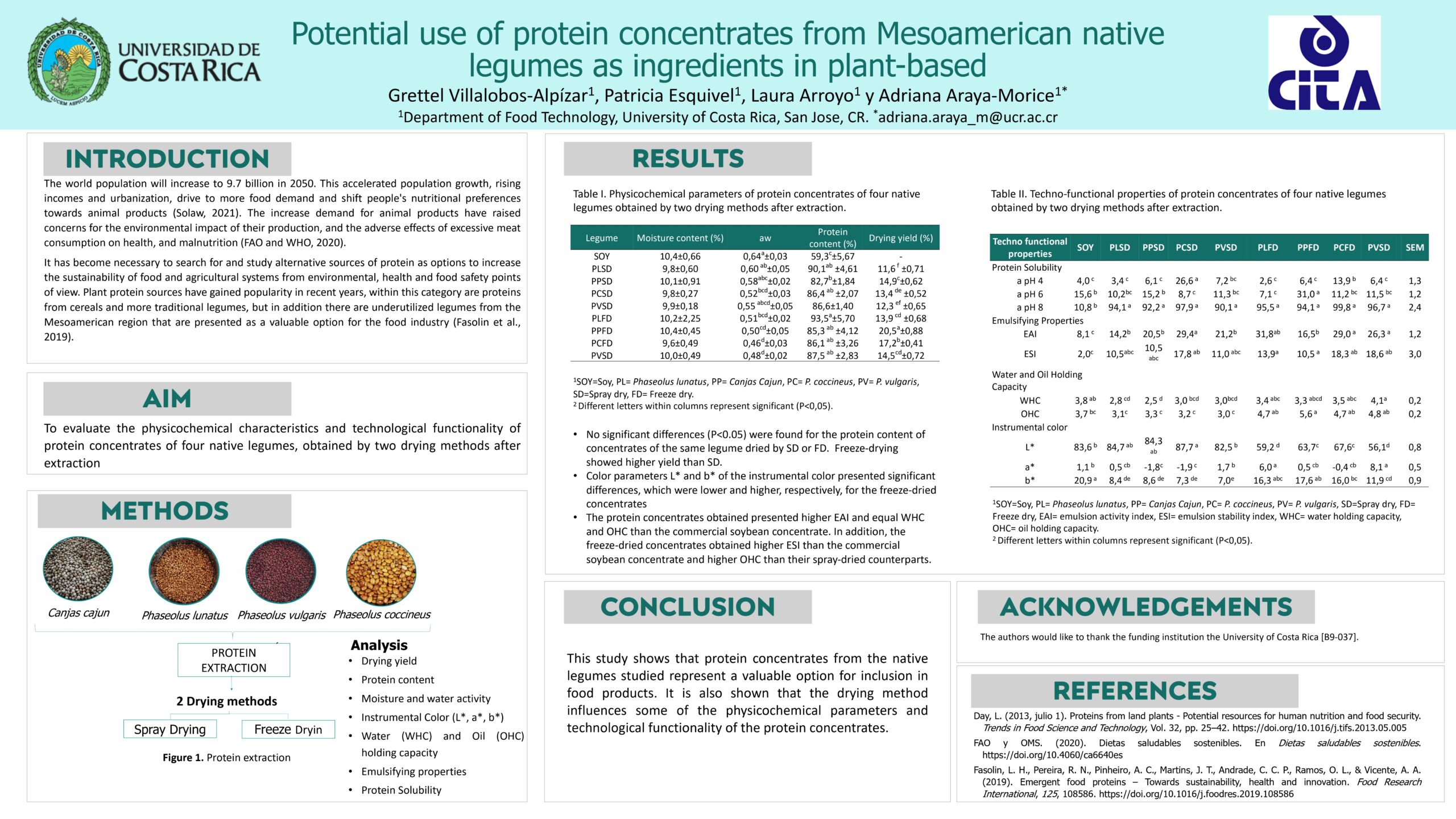
S4-2: Artificial Intelligence Assisted Ascertainment of Protein Content in Meat and Alternative Meat Patty Products
Yim B., Ho, Sherman, Lai A.
Download Abstract
Download E-Poster
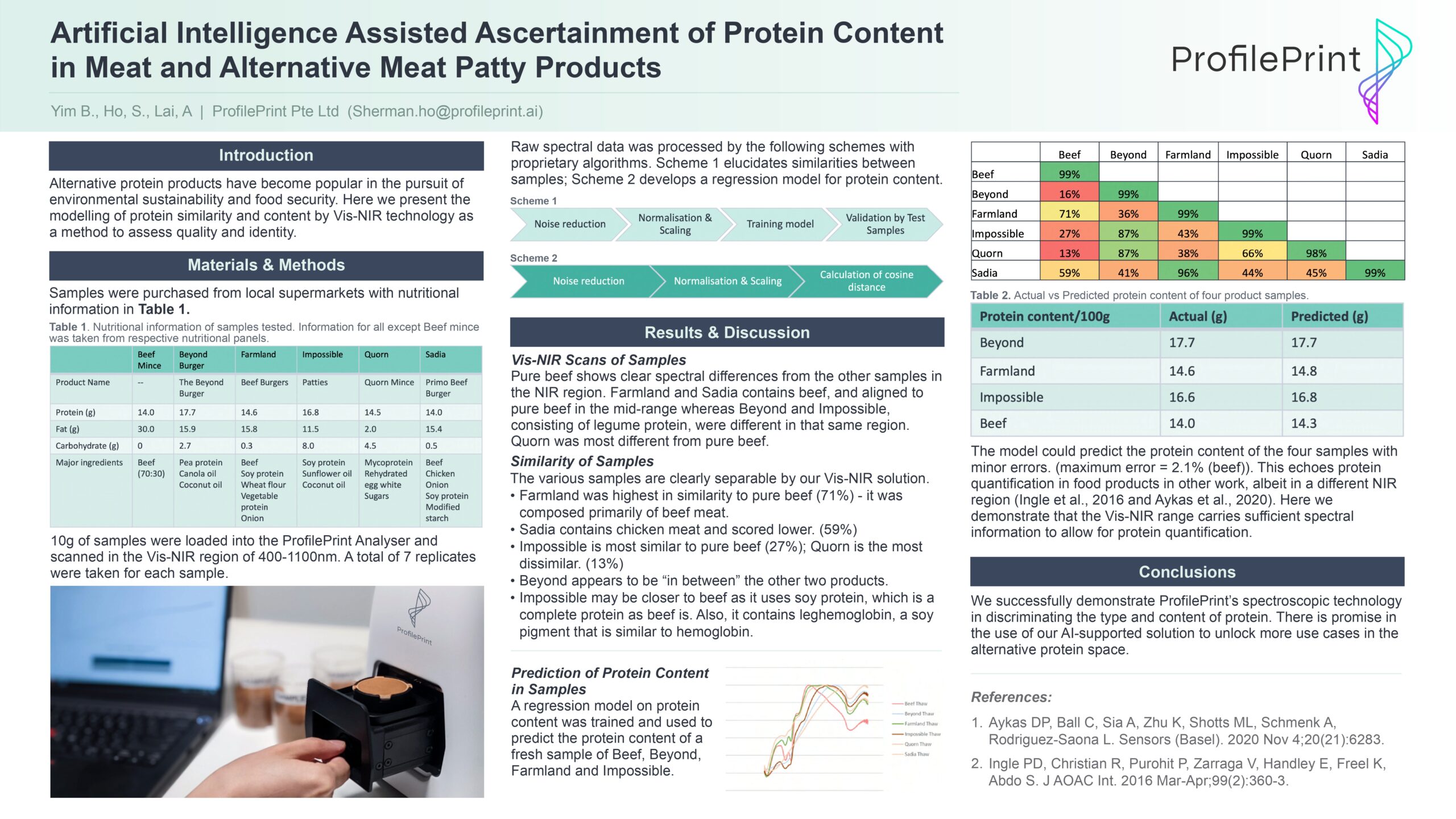
Session Theme 5: Innovations to Meet Consumer Acceptance and Regulatory Science Development
S5-1: Consumption of Plant-Based Meat Alternatives by Regular Consumers and their Motivations to Sustain Long-Term Intake
Siti Amelia Juraimi, Aimee E. Pink, Florence Sheen, Benjamin P.C. Smith
Download Abstract
Download E-Poster
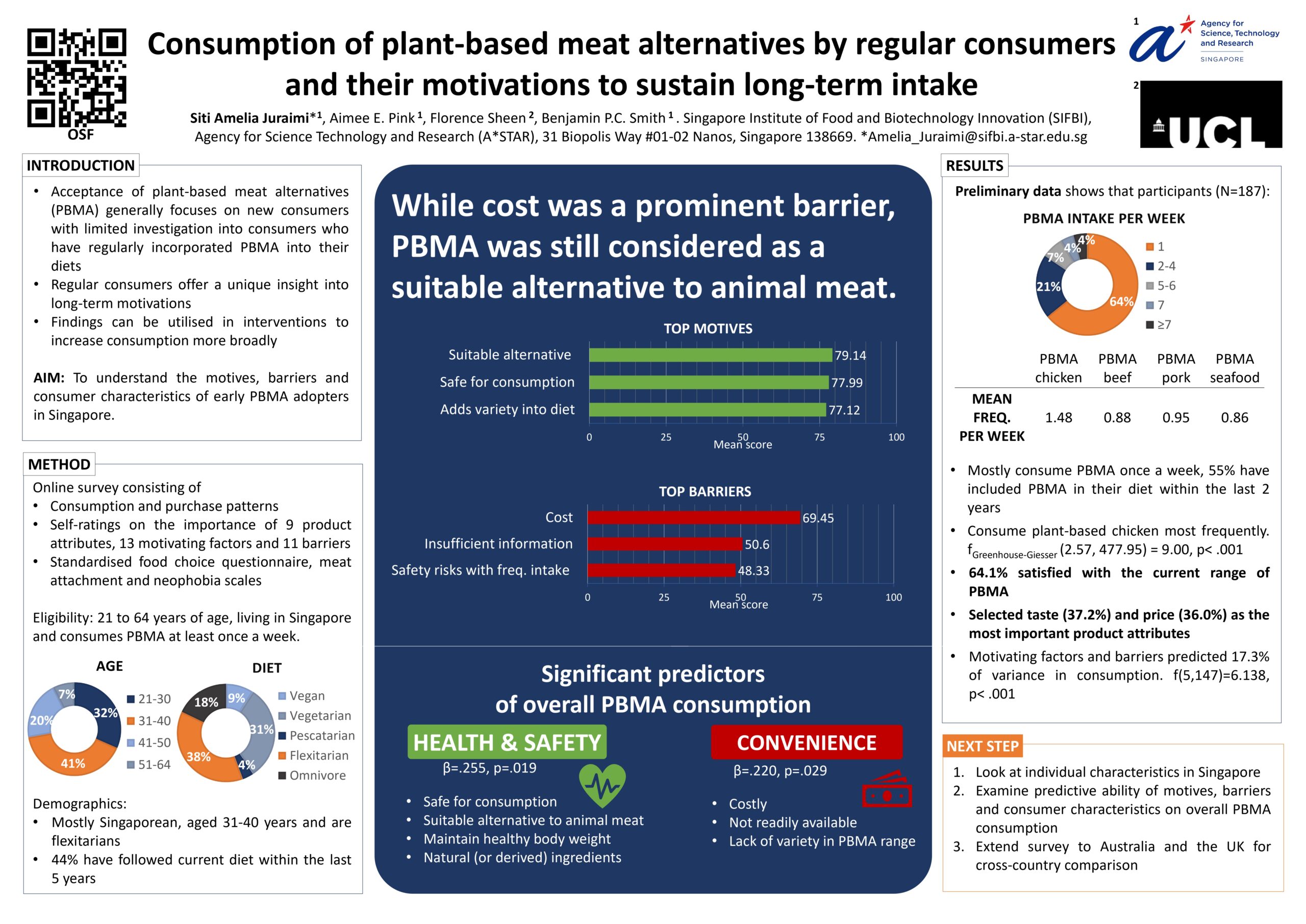
S5-3: Computational Prediction of Protein Allergenicity in Food and Personal Care Products
Minh N. Nguyen, Nora L. Krutz, Vachiranee Limviphuvadh, Andreas L. Lopata, G. Frank Gerberick, and Sebastian Maurer-Stroh
Download Abstract
Download E-Poster
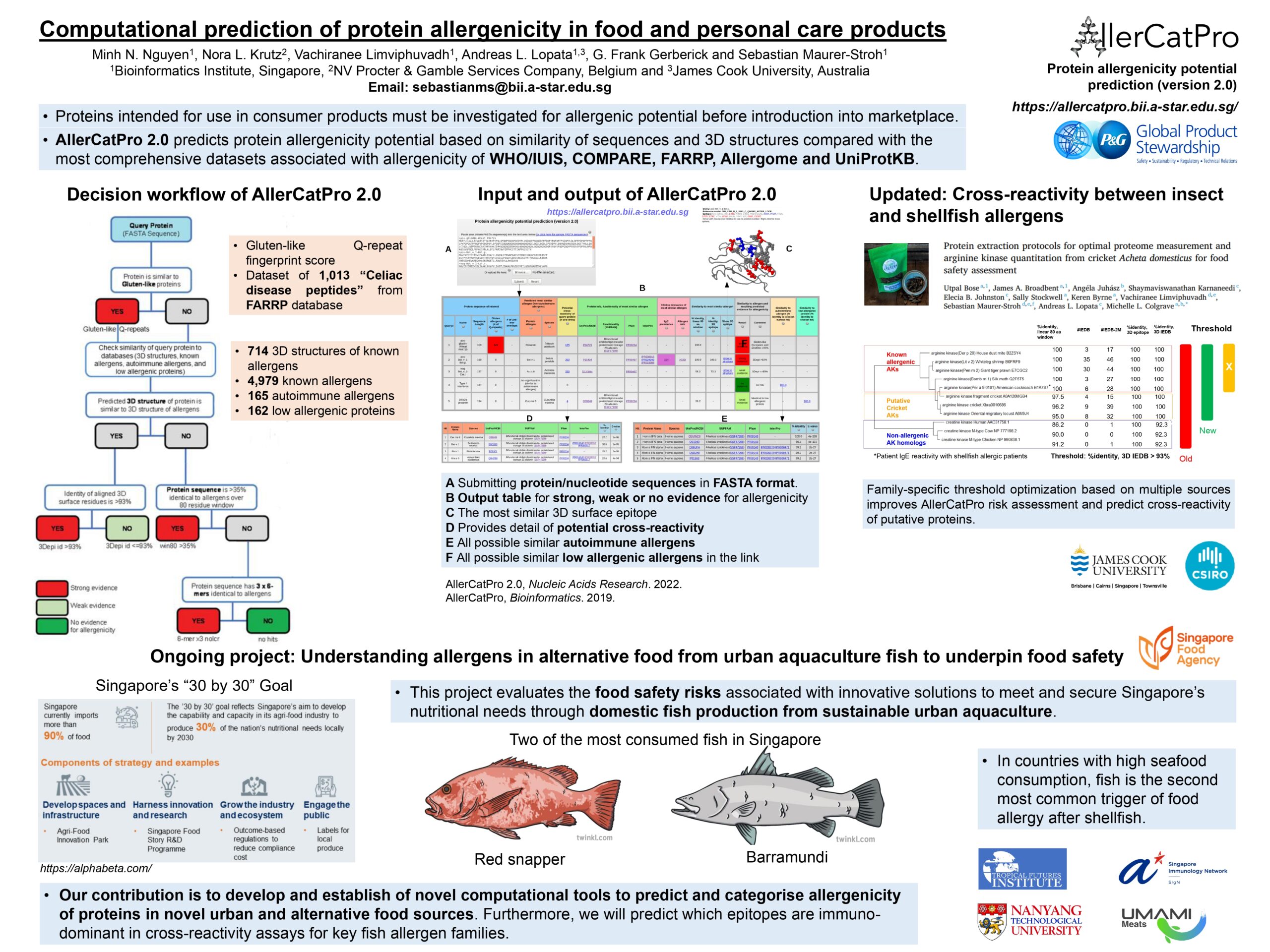
S5-2: Are Plant-based Meat Analogues Healthier than their Meat Counterparts?
Xinyan BI, Michelle YEO, Christiani Jeyakumar HENRY
Download Abstract
Download E-Poster
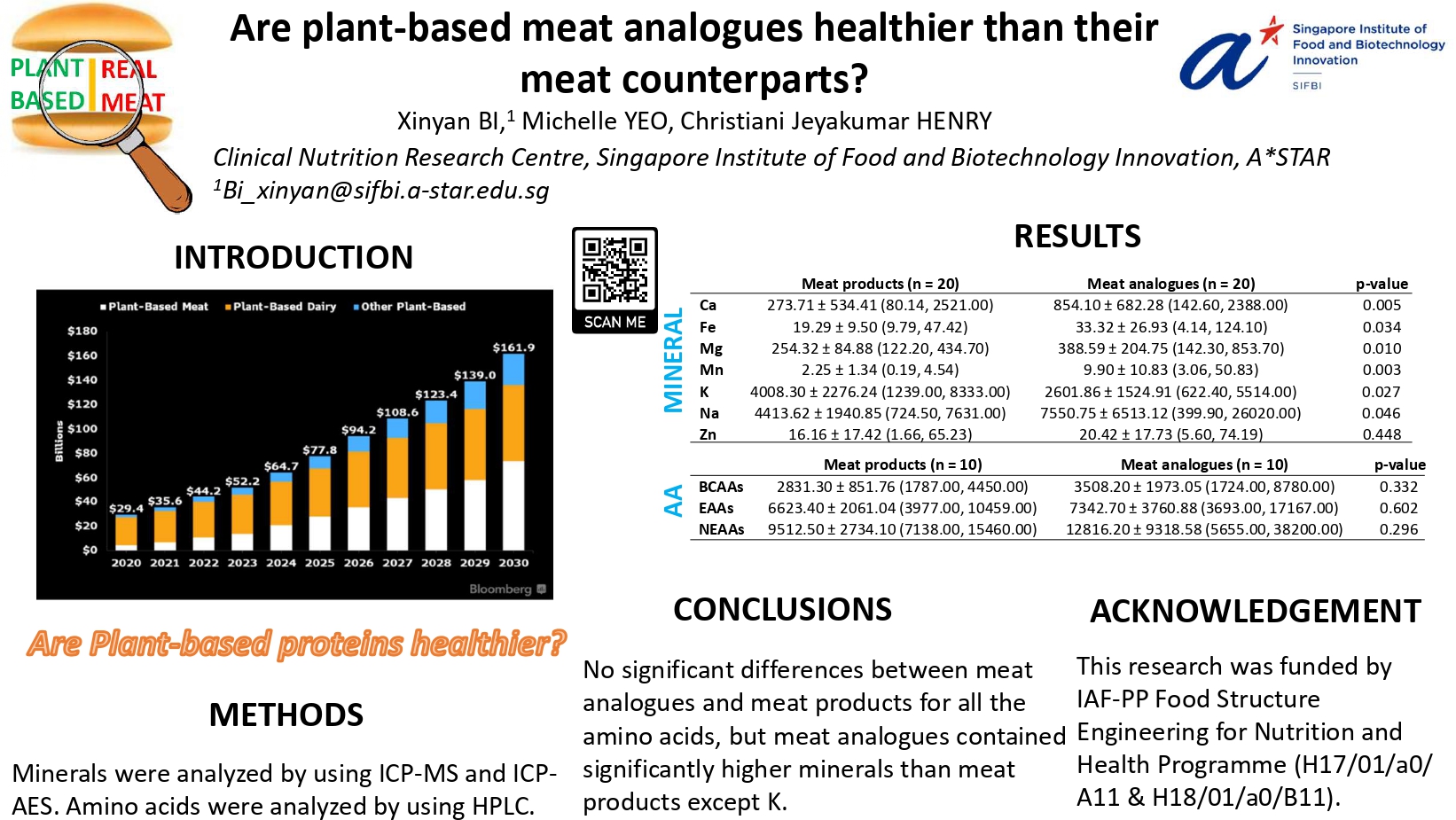
S5-4: Allergens in Edible Cricket (Acheta domesticus): Extraction Methods and (human IgE) Antibody Reactivity
Shaymaviswanathan Karnaneedi, Elecia B. Johnston, Utpal Bose, Angéla Juhász, James A. Broadbent, Sally Stockwell, Keren Byrne, Sandip D. Kamath, Vachiranee Limviphuvadh, Thimo Ruethers, Sebastian Maurer-Stroh, Michelle L. Colgrave, Andreas L. Lopata
Download Abstract
Download E-Poster
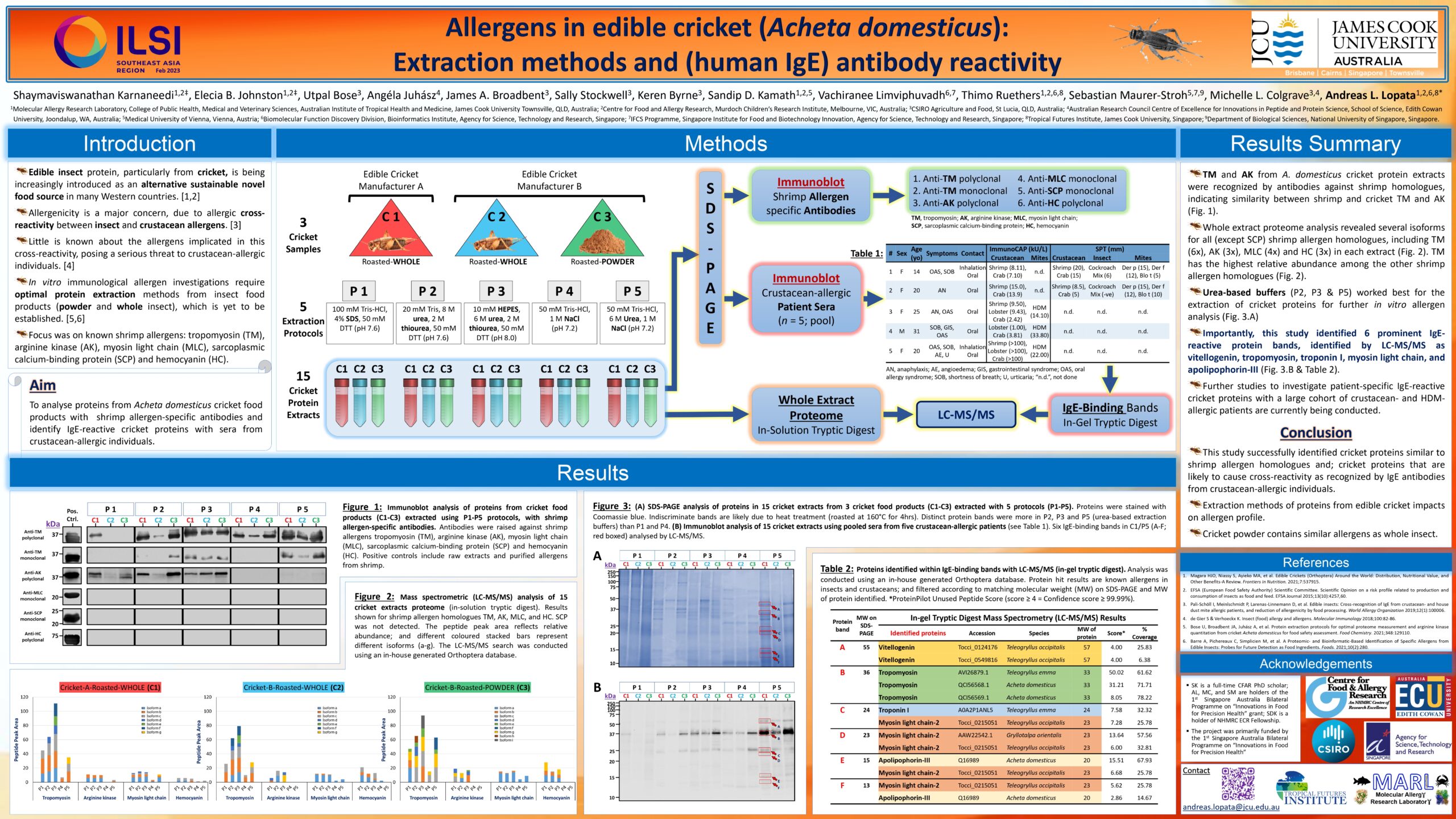
Organizer

Collaborators


Contact
If you have any enquiries on this event, please contact ILSI SEA Region Secretariat at event@ilsisea.org.sg
[post_title] => Symposium: ReThink Protein Needs and Dietary Shift in Southeast Asia – Health, Innovation and Sustainability
[post_excerpt] =>
[post_status] => publish
[comment_status] => closed
[ping_status] => closed
[post_password] =>
[post_name] => protein-dietaryshift-southeastasia
[to_ping] =>
[pinged] =>
[post_modified] => 2023-06-13 05:06:20
[post_modified_gmt] => 2023-06-13 05:06:20
[post_content_filtered] =>
[post_parent] => 0
[guid] => https://ilsisea-region.org/?post_type=event&p=29548
[menu_order] => 0
[post_type] => event
[post_mime_type] =>
[comment_count] => 0
[filter] => raw
)
)
[post_count] => 1
[current_post] => -1
[before_loop] =>
[in_the_loop] =>
[post] => WP_Post Object
(
[ID] => 29548
[post_author] => 353
[post_date] => 2022-12-04 03:02:23
[post_date_gmt] => 2022-12-04 03:02:23
[post_content] =>
 Click Here to Register
Click Here to Register
BACKGROUND
New initiatives and research by government agencies, academia, agri-technology and food sectors are reviewing protein needs in the context of production, health and sustainability. Within Southeast Asia, it is timely to re-assess protein sources, requirements and intakes, and to evaluate protein quality in our varied diets. New knowledge on protein science and novel protein sources will inform dietary recommendations, advance innovation and product development, and help address nutritional and sustainability gaps.
This symposium will bring together subject experts, researchers, health professionals, food scientists, government agencies, industry and product innovators to share and discuss the latest from research to development.
REGISTRATION
This 1.5-day symposium will be hosted in a hybrid format (In-person & virtual).
Registration Rates are as follows:
In-Person
Industry S$220.00
Academia S$150.00
Virtual S$60.00
**Virtual registration is applicable only for participants outside of Singapore.
Registration is open until February 16, 2023, 23:59 SGT.
Note: Certificate of attendance is available upon request.
PROGRAM AND SPEAKERS
DAY 1: Tuesday, February 21, 2023
Session 1: ReLook Protein Science, Requirements and Consumption Impacting Nutrition, Health and Sustainability
Expand
Chair: Prof. Reshma Taneja, Department of Physiology, Yong Loo Lin School of Medicine, National University of Singapore
 Prof. Reshma Taneja is Head of the Department of Physiology at the National University of Singapore. She obtained her Ph.D. degree from the Indian Institute of Science and completed her postdoctoral training in the laboratory of Prof Pierre Chambon at the IGBMC in France. Her own laboratory, initially at the Mount Sinai School of Medicine in New York City, and now at the National University of Singapore, has a long-standing interest in understanding skeletal muscle biology and its de-regulation in human myopathies. She has published her work in high profile journals and serves on many editorial boards as well as grant review panels locally and internationally. Prof. Reshma has received multiple awards including a Scholar Award from the Leukemia and Lymphoma Society in the USA; as well as Faculty Research, Teaching and Mentoring Awards in Singapore.
Prof. Reshma Taneja is Head of the Department of Physiology at the National University of Singapore. She obtained her Ph.D. degree from the Indian Institute of Science and completed her postdoctoral training in the laboratory of Prof Pierre Chambon at the IGBMC in France. Her own laboratory, initially at the Mount Sinai School of Medicine in New York City, and now at the National University of Singapore, has a long-standing interest in understanding skeletal muscle biology and its de-regulation in human myopathies. She has published her work in high profile journals and serves on many editorial boards as well as grant review panels locally and internationally. Prof. Reshma has received multiple awards including a Scholar Award from the Leukemia and Lymphoma Society in the USA; as well as Faculty Research, Teaching and Mentoring Awards in Singapore.
Co-chair: Mr. Geoffry Smith, ILSI SEA Region
 Mr. Geoffry Smith is President of ILSI Southeast Asia Region based in Singapore, and a Representative of the branch to the ILSI Global Assembly. He is also the Chairman of the Essential Micronutrients Foundation, a non-profit organization which addresses micronutrient deficiencies globally as a public health issue. In addition, he is Director of Nutrition Strategies International which deals with food and nutrition issues in developing countries. Mr. Smith serves as a member of the editorial board of the journal Food and Nutrition Bulletin. Prior to his current positions, Mr. Smith was the Global Director, Health Chelates for Akzo Nobel Functional Chemicals, and directed the global business for these compounds in food and nutrition as well as pharmaceutical applications. He was responsible for the global project within Akzo Nobel addressing iron deficiency anemia.
Mr. Geoffry Smith is President of ILSI Southeast Asia Region based in Singapore, and a Representative of the branch to the ILSI Global Assembly. He is also the Chairman of the Essential Micronutrients Foundation, a non-profit organization which addresses micronutrient deficiencies globally as a public health issue. In addition, he is Director of Nutrition Strategies International which deals with food and nutrition issues in developing countries. Mr. Smith serves as a member of the editorial board of the journal Food and Nutrition Bulletin. Prior to his current positions, Mr. Smith was the Global Director, Health Chelates for Akzo Nobel Functional Chemicals, and directed the global business for these compounds in food and nutrition as well as pharmaceutical applications. He was responsible for the global project within Akzo Nobel addressing iron deficiency anemia.
Dietary Proteins in Human Nutrition - Recent Advances
Prof. Paul Moughan, Riddet Institute Fellow Laureate, Massey University, New Zealand

Prof. Paul Moughan was appointed to the foundation chair in monogastric biology at Massey University in 1993 and from 1997-2003 was Foundation Head, Institute of Food, Nutrition and Human Health, Massey University. From 2003 until 2017 he held the position of Foundation Co-Director of the Riddet Institute, a National Centre of Research Excellence in Food Science and Human Nutrition. Prof Moughan currently holds the position of Distinguished Professor at Massey University and Riddet Institute Fellow Laureate. His research has encompassed human and animal nutrition, food chemistry, functional foods, digestive physiology and sustainable food production. He has published more than 450 scientific works. In 1995 he was awarded Doctor of Science and in 1997 was awarded a Personal Chair at Massey University and was elected a Fellow of the Royal Society of New Zealand. In 2011 he was appointed Chair of the FAO Expert Consultation to review recommendations on the characterization of dietary protein quality in humans, and has been a frequent contributor to FAO and WHO expert Committees. He has received numerous prestigious international awards for his work, including the New Zealand Prime Minister's Science Prize in 2012, the Honorary Doctor of Science from the University of Guelph, Canada in 2014, and the Wageningen University Medal of Honour in 2018. Prof Moughan sits on a number of editorial boards for scientific journals and is an adviser to the international food industry. Since 2015, he has been invited to contribute to several projects and authorships of the International Academies Partnership (IAP), including a regional IAP policy briefing for the UN Food Systems Summit.
Food Protein - Evaluating Current Supply, Consumption and Intake Guidance for Gap Identification in SE Asia
Prof. Cecilia Acuin, Associate Professor, Institute of Human Nutrition and Food, University of the Philippines Los Baños, the Philippines
 Prof. Cecilia Acuin is an Associate Professor at the Institute of Human Nutrition and Food, University of the Philippines, Los Baños and served as Senior Scientist, lead for Human Nutrition, at the International Rice Research Institute (IRRI), Philippines until May 2020.
Prof. Cecilia Acuin is an Associate Professor at the Institute of Human Nutrition and Food, University of the Philippines, Los Baños and served as Senior Scientist, lead for Human Nutrition, at the International Rice Research Institute (IRRI), Philippines until May 2020.
Prior to her work at IRRI she was also the Chief Science Research Specialist, Nutritional Assessment & Monitoring Division and Chair, Institutional Ethics Committee at the Food & Nutrition Research Institute (FNRI), Department of Science & Technology, Philippines. In this position, she was responsible for the conduct of the Philippine National Nutrition Surveys, and oversaw nutrition research projects of three Sections: the Nutritional Assessment Section, the Nutritional Statistics and Informatics Section, and the Nutritional Interventions, Evaluation and Policy Section. Her research interests are in the areas of maternal and child health and nutrition, food security, food and health systems and operations research, and risk factors of non-communicable diseases.
Dr. Acuin's involvement in multi-country research initiatives includes the following among many others: as a Member of the International Union of Nutritional Sciences Committee on Nutrition and Anthropology; and as a Consultant and Vice-Chair of the WPRO Regional Advisory Committee on Health Research in the WHO Western Pacific Region. In the Philippines, Dr. Acuin has been the Co-Chair of the Philippine National Health Research System, Research Utilization Committee; Head of the Secretariat of the Universal Health Care (UHC) Study Group; Consultant in various capacities of USAID, UNICEF, World Bank, etc., as well as for academic institutions and local organizations such as the Zuellig Family Foundation among others. She obtained her Ph.D. in Nutrition with minors in Nutritional Epidemiology and Risk Communication from Cornell University, USA.
Session 2: Review and Assess Protein Quality and Dietary Shifts
Expand
Chair: Prof. Reshma Taneja, Department of Physiology,
Yong Loo Lin School of Medicine, National University of Singapore
Co-chair: Mr. Geoffry Smith, ILSI SEA Region
Assessing Protein Quality of Sustainable Food Sources to Improve Nutrition in Asia
Assoc. Prof. Wantanee Kriengsinyos, Associate Professor, Institute of Nutrition, Mahidol University, Thailand
 Dr. Wantanee Kriengsinyos has 20 years of professional experience in clinical nutrition and dietetics. Her current research involves metabolic studies of food products in development of non-communicable diseases (NCDs); body composition and energy expenditure; diet and behavior modification for patients with diet-related chronic diseases; and protein quality and amino-acid metabolism. Over the past 5 years, Dr. Kriengsinyos has also developed experience in nutrition policy and was a part of the team that successfully worked to ban partially-hydrogenated oils in Thailand. She currently leads a promotion project on implementation of healthier food logos to combat NCDs through reduction of sugar, fat, and sodium consumption in the Thai population. Currently, Dr. Kriengsinyos is chair of the Master of Science in Nutrition and Dietetics program at the Institute of Nutrition, Mahidol University. She received a doctorate in Nutritional Sciences at the University of Toronto, Canada, and holds a Registered Dietitian credential from the United States.
Dr. Wantanee Kriengsinyos has 20 years of professional experience in clinical nutrition and dietetics. Her current research involves metabolic studies of food products in development of non-communicable diseases (NCDs); body composition and energy expenditure; diet and behavior modification for patients with diet-related chronic diseases; and protein quality and amino-acid metabolism. Over the past 5 years, Dr. Kriengsinyos has also developed experience in nutrition policy and was a part of the team that successfully worked to ban partially-hydrogenated oils in Thailand. She currently leads a promotion project on implementation of healthier food logos to combat NCDs through reduction of sugar, fat, and sodium consumption in the Thai population. Currently, Dr. Kriengsinyos is chair of the Master of Science in Nutrition and Dietetics program at the Institute of Nutrition, Mahidol University. She received a doctorate in Nutritional Sciences at the University of Toronto, Canada, and holds a Registered Dietitian credential from the United States.
Protein Intake, Requirements, and Dietary Shift in SE Asia - Opportunities and Challenges
Prof. Christiani Jeyakumar Henry, Deputy Executive Director, Singapore Institute of Food and Biotechnology Innovation, A*STAR, Singapore
 Prof. Christiani Jeyakumar Henry is currently the Deputy Executive Director of the Singapore Institute of Food and Biotechnology Innovation (SIFBI) and the director of the Clinical Nutrition Research Centre. He initially trained as a food scientist and subsequently obtained his MSc and PhD in Nutrition from the London School of Hygiene and Tropical Medicine. He was instrumental in the development & launch of the UK's first dedicated Functional Food Centre. Professor Henry has served on several committees including the UK Committee on Medical Aspects of Food & Nutrition Policy (COMA) panel on novel foods, was a board member of the UK Food Standards Agency and was a member of the General Advisory Committee on Science (GACS) of the Food Standard Agency (FSA). He also served as a panel member on the UK Department for International Development (DFID) health and population research committee and was a member of the research panel of the UK Crop post-harvest Technology. He was a Royal Society visiting professor at the Chinese University of Hong Kong & continues to remain a visiting professor at the same university.
Prof. Christiani Jeyakumar Henry is currently the Deputy Executive Director of the Singapore Institute of Food and Biotechnology Innovation (SIFBI) and the director of the Clinical Nutrition Research Centre. He initially trained as a food scientist and subsequently obtained his MSc and PhD in Nutrition from the London School of Hygiene and Tropical Medicine. He was instrumental in the development & launch of the UK's first dedicated Functional Food Centre. Professor Henry has served on several committees including the UK Committee on Medical Aspects of Food & Nutrition Policy (COMA) panel on novel foods, was a board member of the UK Food Standards Agency and was a member of the General Advisory Committee on Science (GACS) of the Food Standard Agency (FSA). He also served as a panel member on the UK Department for International Development (DFID) health and population research committee and was a member of the research panel of the UK Crop post-harvest Technology. He was a Royal Society visiting professor at the Chinese University of Hong Kong & continues to remain a visiting professor at the same university.
Intake of Animal and other Protein Source Foods and the Nutritional Significance on Infants and Young Children in SE Asia (Virtual Presentation)
Dr. Umi Fahmida, Senior Researcher & Program Coordinator, SEAMEO RECFON, Indonesia
 Dr. Umi Fahmida is a Senior Researcher and Program Coordinator of Early Childhood Care, Nutrition, and Education (ECCNE) at Southeast Asian Ministers of Education Organization Regional Centre for Food and Nutrition (SEAMEO RECFON), Universitas Indonesia, Jakarta, Indonesia. She holds Ph.D. in Nutrition and MSc in Community Nutrition from Faculty of Medicine at Universitas Indonesia and Bachelor in Agriculture Technology from Faculty of Agriculture Technology at Bogor Agriculture University. Her research interests are in the nutrient and non-nutrient interaction related to child growth and development. In the past 20 years, she has been working with diet modelling using linear/goal programming (LP) to develop and evaluate food-based recommendations, and to use the identified nutrient gap to develop food multi-mix using locally-available nutrient-dense foods. Under "Model of partnership to translate guidelines into practices for the optimal diet of Southeast Asia community", Dr. Fahmida and her team promoted the LP approach in Indonesia, Cambodia, Lao PDR, Malaysia, Myanmar, and the Philippines for both communities, school and workplace settings. Currently, she is involved in the UK Research and Innovation (UKRI) Global Challenges Research Fund (GCRF) Action Against Stunting Hub, an interdisciplinary multi-centre multi-country study, as Country Lead for Indonesia.
Dr. Umi Fahmida is a Senior Researcher and Program Coordinator of Early Childhood Care, Nutrition, and Education (ECCNE) at Southeast Asian Ministers of Education Organization Regional Centre for Food and Nutrition (SEAMEO RECFON), Universitas Indonesia, Jakarta, Indonesia. She holds Ph.D. in Nutrition and MSc in Community Nutrition from Faculty of Medicine at Universitas Indonesia and Bachelor in Agriculture Technology from Faculty of Agriculture Technology at Bogor Agriculture University. Her research interests are in the nutrient and non-nutrient interaction related to child growth and development. In the past 20 years, she has been working with diet modelling using linear/goal programming (LP) to develop and evaluate food-based recommendations, and to use the identified nutrient gap to develop food multi-mix using locally-available nutrient-dense foods. Under "Model of partnership to translate guidelines into practices for the optimal diet of Southeast Asia community", Dr. Fahmida and her team promoted the LP approach in Indonesia, Cambodia, Lao PDR, Malaysia, Myanmar, and the Philippines for both communities, school and workplace settings. Currently, she is involved in the UK Research and Innovation (UKRI) Global Challenges Research Fund (GCRF) Action Against Stunting Hub, an interdisciplinary multi-centre multi-country study, as Country Lead for Indonesia.
Session 3: Protein and Health - Research and Guidance for Optimal Functional Benefits
Expand
Chair: Prof. David Cameron-Smith, School of Environmental and Life Sciences, University of Newcastle, Australia
 Prof. David Cameron-Smith is currently Professor of Food Innovation and leading the development of a Centre of Food and Agri-business Innovation, University of Newcastle, Australia. Prof Cameron-Smith was appointed to this role in March 2022 after more than 25 years of human nutrition research and strategic science leadership, including serving as Senior Principal Investigator, Singapore Institute of Clinical Sciences (2019-22). His scientific research includes a detailed understanding of how high protein foods and beverages impact human health (including personalised nutrition), ageing malnutrition risk, muscular loss, gut health and mood. This includes leading 19 registered clinical trials and publishing 300+ scientific papers.
Prof. David Cameron-Smith is currently Professor of Food Innovation and leading the development of a Centre of Food and Agri-business Innovation, University of Newcastle, Australia. Prof Cameron-Smith was appointed to this role in March 2022 after more than 25 years of human nutrition research and strategic science leadership, including serving as Senior Principal Investigator, Singapore Institute of Clinical Sciences (2019-22). His scientific research includes a detailed understanding of how high protein foods and beverages impact human health (including personalised nutrition), ageing malnutrition risk, muscular loss, gut health and mood. This includes leading 19 registered clinical trials and publishing 300+ scientific papers.
Co-chair: Mr. Geoffry Smith, ILSI SEA Region
Exercise, Nutrition & Muscle Health (Virtual Presentation)
Prof. Stuart Phillips, Professor, Department of Kinesiology, McMaster University, Canada

Prof. Stuart Phillips is a Tier 1 Canada Research Chair in Skeletal Muscle Health. He is also the Director of the McMaster University Physical Activity Centre of Excellence. Dr. Phillips has authored more than 350 research papers. In 2018-22 he was named to Clarivate's Highly Cited Researchers list as being in the top 1% of all cited researchers in nutrition and physiology research. Dr. Phillips is a fellow of the American College of Sports Medicine and the Canadian Academy of Health Sciences.
Understanding Protein Homeostasis - Improving Protein Metabolism and Reducing Sarcopenia
Prof. Shih-Yin Tsai, Assistant Professor, Department of Physiology, Yong Loo Lin School of Medicine, National University of Singapore
 Assistant Professor Shih-Yin Tsai received her Ph.D. in Dr. Gustavo Leone's lab at the Ohio State University (2009), where she studied the mechanisms by which mammalian E2F transcription factors control cell proliferation. She showed the functional redundancy among E2F activators during development and the specific roles of E2F family members during long-term maintenance. After her Ph.D., she did her postdoctoral training in Dr. Brian Kennedy's lab at the University of Washington and continued her research at the Buck Institute. She investigated the role of mTORC1 downstream translation effecter, 4E-BP1, in regulating metabolic homeostasis during the progression of type II diabetes and aging. Since February 2017, she started her lab as an Assistant Professor at the Department of Physiology at the National University of Singapore. Her study focuses on exploring how protein homeostasis in the regulation of muscle health. Using transgenic mouse models and primary 3D in vitro models of skeletal muscle, her lab studies the aging process at molecular levels to provide an explicit picture of muscle aging for potential therapeutic usage.
Assistant Professor Shih-Yin Tsai received her Ph.D. in Dr. Gustavo Leone's lab at the Ohio State University (2009), where she studied the mechanisms by which mammalian E2F transcription factors control cell proliferation. She showed the functional redundancy among E2F activators during development and the specific roles of E2F family members during long-term maintenance. After her Ph.D., she did her postdoctoral training in Dr. Brian Kennedy's lab at the University of Washington and continued her research at the Buck Institute. She investigated the role of mTORC1 downstream translation effecter, 4E-BP1, in regulating metabolic homeostasis during the progression of type II diabetes and aging. Since February 2017, she started her lab as an Assistant Professor at the Department of Physiology at the National University of Singapore. Her study focuses on exploring how protein homeostasis in the regulation of muscle health. Using transgenic mouse models and primary 3D in vitro models of skeletal muscle, her lab studies the aging process at molecular levels to provide an explicit picture of muscle aging for potential therapeutic usage.
Protein and Bone Health, Micrnutrient Intakes, and Different Protein Sources (Virtual Presentation)
Dr. Kiran Bains, Head, Department of Food and Nutrition, Punjab Agricultural University, India
 Dr. Kiran Bains is presently working as Head, Dept. of Food and Nutrition, PAU, Ludhiana. She has handled 12 adhoc research projects and guided 25 M.Sc. and 9 Ph.D. students. She has worked at Center of Innovative and Applied Bioprocessing (CIAB), Mohali as sabbatical faculty. She has achieved a competitive project funded by Harvest Plus, IFPRI, Washington DC in 2011 on assessment of zinc status of children and women. She has completed three projects funded by World Vegetable Center, Taiwan and a consultancy project funded by UNFPA. She is currently working on a project funded by Nestle India Limited. She has been invited by The World Vegetable Center, Taiwan and Riddet Centre, Massey University New Zealand as visiting fellow in the year 2003 and 2007, respectively. She has represented India at International Workshop to exchange best practices in nutrition awareness programs participated by representatives of 35 countries in 2010 at London, U.K. She had been nominated by government of India to attend Indo New Zealand Workshop on 'Food and Agriculture' at Lincoln University, Christchurch and Massey University, New Zealand in 2011. She has published 125 research papers, 7 book chapters, 14 manual chapters, 5 booklets/pamphlets and 30 popular articles. She has contributed in the development of "Regional adaptation and update of food item based dietary guidelines of National Institute of Nutrition (NIN) with emphasis on cardiovascular diseases. Presently she is convener of Ludhiana chapter of Nutrition Society of India (NSI). Her research activities are mainly focused on micronutrient deficiencies; bioavailability of minerals; energy, protein and iron status of population groups.
Dr. Kiran Bains is presently working as Head, Dept. of Food and Nutrition, PAU, Ludhiana. She has handled 12 adhoc research projects and guided 25 M.Sc. and 9 Ph.D. students. She has worked at Center of Innovative and Applied Bioprocessing (CIAB), Mohali as sabbatical faculty. She has achieved a competitive project funded by Harvest Plus, IFPRI, Washington DC in 2011 on assessment of zinc status of children and women. She has completed three projects funded by World Vegetable Center, Taiwan and a consultancy project funded by UNFPA. She is currently working on a project funded by Nestle India Limited. She has been invited by The World Vegetable Center, Taiwan and Riddet Centre, Massey University New Zealand as visiting fellow in the year 2003 and 2007, respectively. She has represented India at International Workshop to exchange best practices in nutrition awareness programs participated by representatives of 35 countries in 2010 at London, U.K. She had been nominated by government of India to attend Indo New Zealand Workshop on 'Food and Agriculture' at Lincoln University, Christchurch and Massey University, New Zealand in 2011. She has published 125 research papers, 7 book chapters, 14 manual chapters, 5 booklets/pamphlets and 30 popular articles. She has contributed in the development of "Regional adaptation and update of food item based dietary guidelines of National Institute of Nutrition (NIN) with emphasis on cardiovascular diseases. Presently she is convener of Ludhiana chapter of Nutrition Society of India (NSI). Her research activities are mainly focused on micronutrient deficiencies; bioavailability of minerals; energy, protein and iron status of population groups.
Protein & Amino Acids - Optimizing Immunity (Virtual Presentation)
Prof. Philip Calder, Professor, Nutritional Immunology, & Head, School of Human Development & Health, University of Southampton, United Kingdom

Prof. Philip Calder is Professor of Nutritional Immunology and Head of the School of Human Development and Health, Faculty of Medicine, University of Southampton, United Kingdom. He obtained his PhD in Biochemistry in 1987 and spent 8 years at the University of Oxford, before his appointment at the University of Southampton in 1995. Prof Calder is an internationally recognised researcher on a) nutritional immunology, and b) metabolism and functionality of fatty acids with an emphasis on the roles of omega-3 fatty acids. He has received many awards and prizes for his work including the Normann Medal (German Society of Fat Science; 2009), the Ralph Holman Lifetime Achievement Award (American Oil Chemists' Society; 2015), the Danone International Prize for Nutrition (2016), the DSM Lifetime Achievement Prize in Human Nutrition (2017) and the European Lipid Science Award (2021). Prof Calder was President of the International Society for the Study of Fatty Acids and Lipids (2009-2012), Chair of the Scientific Committee of the European Society for Clinical Nutrition and Metabolism (2012-2016), President of the Nutrition Society (2016-2019), and President of ILSI Europe (2019-2021). He was also the Editor-in-Chief of the British Journal of Nutrition (2006- 2013) and is now the Associate Editor of Clinical Science, Journal of Nutrition and Annals of Nutrition and Metabolism. He is currently President of the Federation of European Nutrition Societies.
Protein and Musculoskeletal Health over the Life Course
Prof. Andrea Maier, Co-Director, Centre for Healthy Longevity, Yong Loo Lin School of Medicine, National University of Singapore

Prof. Andrea Maier (1978), a Fellow of the Royal Australasian College of Physicians (FRACP), graduated in Medicine (MD) 2003 from the University of Lübeck (Germany), was registered 2009 in The Netherlands as Specialist in Internal Medicine-Geriatrics and was appointed Full Professor of Gerontology at Vrije Universiteit Amsterdam (The Netherlands) in 2013. She was the head of Geriatrics at the Vrije Universiteit Medical Center from 2012 to 2016. From 2016 to early 2021 Professor Maier served as Divisional Director of Medicine and Community Care at the Royal Melbourne Hospital, Australia, and as Professor of Medicine and Aged Care at the University of Melbourne, Australia. She continued her career at the National University of Singapore as Co-Director of the Centre for Healthy Longevity. Professor Maier's research focuses on unraveling the mechanisms of ageing and age-related diseases. She is heading international longitudinal cohort studies and geroscience interventions. During the last 12 years she has published more than 370 peer-reviewed articles, achieving an H index of 68, spearheading the significant contributions of her highly acclaimed innovative, global, multidisciplinary @Age research group. She is a frequent guest on radio and television programs to disseminate aging research and an invited member of several international academic and health policy committees, including the WHO. She is the past President of The Australian and New Zealand Society for Sarcopenia and Frailty Research, the Founding President of the Healthy Longevity Medicine Society and serves as selected Member of The Royal Holland Society of Sciences and Humanities.
DAY 2: Wednesday, February 22, 2023
Session 4: Future of Protein - Technologies and Value Proposition of Alternative and Complementary Sources
Expand
Chair: Prof. Zhou Weibiao, Department of Food Science and Technology, National University of Singapore
 Prof. Weibiao Zhou is the foundation Head of the Department of Food Science and Technology and the inaugural Cheng Tsang Man Chair Professor in Food Science and Technology, National University of Singapore (NUS). Trained originally in chemical engineering, he has been working as a food scientist for over 30 years in multiple countries including Australia, China, France, Spain and USA. Among his many professional appointments and honours are: Elected Fellow of Singapore National Academy of Science (SNAS), International Academy of Food Science and Technology (IAFoST), Australian Institute of Food Science and Technology (AIFST), Royal Society of Chemistry (RSC), the UK, Singapore Institute of Food Science and Technology (SIFST); Chair, Advisory Committee on Evaluation of Health Claims, Singapore Food Agency (SFA); Editor for Food Control (published by Elsevier) and Associate Editor for npj Science of Food (published by Nature).
Prof. Weibiao Zhou is the foundation Head of the Department of Food Science and Technology and the inaugural Cheng Tsang Man Chair Professor in Food Science and Technology, National University of Singapore (NUS). Trained originally in chemical engineering, he has been working as a food scientist for over 30 years in multiple countries including Australia, China, France, Spain and USA. Among his many professional appointments and honours are: Elected Fellow of Singapore National Academy of Science (SNAS), International Academy of Food Science and Technology (IAFoST), Australian Institute of Food Science and Technology (AIFST), Royal Society of Chemistry (RSC), the UK, Singapore Institute of Food Science and Technology (SIFST); Chair, Advisory Committee on Evaluation of Health Claims, Singapore Food Agency (SFA); Editor for Food Control (published by Elsevier) and Associate Editor for npj Science of Food (published by Nature).
Co-chair: Dr. Andrew Wan, Singapore Institute of Food and Biotechnology Innovation, A*STAR, Singapore
 Dr. Andrew Wan is Principal Investigator at the Singapore Institute of Food and Biotechnology Innovation (SIFBI), where his research is focussed on the engineering of plant-based and cultured meat. His team's current research is built on their previous innovative work in 3D-cell culture and tissue engineering, which has been published in top tier journals such as Nature Communications and Nature Nanotechnology. He has been invited to speak at various international meetings, such as the International Symposium on Cultured Meat and International Society of Materials for Regenerative Medicine (ISOMRM) meetings. Prior to joining SIFBI, Dr Wan was Principal Research Scientist at the Institute of Bioengineering and Nanotechnology (2004-2021). He held an adjunct position at the Department of Chemistry, NUS, from 2006 to 2011 and served on the Editorial board of the journal Nanomedicine: Nanotechnology, Biology, and Medicine from 2009-2016. He has served as a panel expert at MOE, Singapore, and was selected to join its delegation to ISEF 2016 as Grand Award Judge. Based on his achievements, he was listed amongst the top 2% of scientists in Bioengineering (2020 Stanford study).
Dr. Andrew Wan is Principal Investigator at the Singapore Institute of Food and Biotechnology Innovation (SIFBI), where his research is focussed on the engineering of plant-based and cultured meat. His team's current research is built on their previous innovative work in 3D-cell culture and tissue engineering, which has been published in top tier journals such as Nature Communications and Nature Nanotechnology. He has been invited to speak at various international meetings, such as the International Symposium on Cultured Meat and International Society of Materials for Regenerative Medicine (ISOMRM) meetings. Prior to joining SIFBI, Dr Wan was Principal Research Scientist at the Institute of Bioengineering and Nanotechnology (2004-2021). He held an adjunct position at the Department of Chemistry, NUS, from 2006 to 2011 and served on the Editorial board of the journal Nanomedicine: Nanotechnology, Biology, and Medicine from 2009-2016. He has served as a panel expert at MOE, Singapore, and was selected to join its delegation to ISEF 2016 as Grand Award Judge. Based on his achievements, he was listed amongst the top 2% of scientists in Bioengineering (2020 Stanford study).
Proteomics Applied to Novel Protein Sources -Risks and Benefits (Virtual Presentation)
Prof. Michelle Colgrave, Deputy Director, CSIRO Agriculture and Food, Australia
 Prof. Michelle Colgrave is the Deputy Director (Impact) for CSIRO Agriculture and Food, based in Brisbane, Australia. She is a Professor of Food and Agricultural Proteomics, and chief investigator on the Australian Research Council Centre of Excellence for Innovations in Peptide and Protein Science. Her research interests include the application of proteomics, the study of proteins using mass spectrometry, to agriculture and food science to the benefit of human health. Professor Michelle Colgrave led CSIRO's Future Protein Mission, a program centred on principles of sustainable growth delivering high quality, affordable and nutritionally optimised protein for Australia. The mission will develop protein-based industries (including traditional protein, plant-based protein, insect and microbial protein) along the value chain from production to the customer, delivering premium protein ingredients and products, addressing the rapid growth of the protein-based sector.
Prof. Michelle Colgrave is the Deputy Director (Impact) for CSIRO Agriculture and Food, based in Brisbane, Australia. She is a Professor of Food and Agricultural Proteomics, and chief investigator on the Australian Research Council Centre of Excellence for Innovations in Peptide and Protein Science. Her research interests include the application of proteomics, the study of proteins using mass spectrometry, to agriculture and food science to the benefit of human health. Professor Michelle Colgrave led CSIRO's Future Protein Mission, a program centred on principles of sustainable growth delivering high quality, affordable and nutritionally optimised protein for Australia. The mission will develop protein-based industries (including traditional protein, plant-based protein, insect and microbial protein) along the value chain from production to the customer, delivering premium protein ingredients and products, addressing the rapid growth of the protein-based sector.
Prof Colgrave is internationally recognised for the development and application of MS techniques for the quantification of gluten (e.g., hordeins in barley; gliadins and glutenins in wheat). The success of this research has been recognized by receipt of the Bowie Medal (ANZSMS), the ICM Agrifood Award (Australian Academy of Technological Sciences and Engineering (ATSE) Innovation and Excellence Awards, 2020), CSIRO Chairman's Medal (2016), and more. Prof. Colgrave received both her B.Sc. and PhD. at the University of Wollongong, Australia. She was recently elected as a Fellow of ATSE for her services to the Agriculture and Food sectors.
Plant-based Meats - Challenges, Market Overview and Available Technologies
Dr.Christian Carrillo, Head, Technology for SEA & Oceania, Bühler Group, Singapore
 Dr. Christian Carrillo is a distinguished leader in the food industry with over a decade of experience driving innovation and sustainability through impactful manufacturing processes. As the Head of Technology for SEA and Oceania at Bühler, he is at the forefront of emerging technologies, leading the development of R&D roadmaps for the Protein Innovation Centre in Singapore. Christian's education began in Switzerland, where he specialized in designing cutting-edge grain processing plants. Since then, he has been stationed in various Bühler offices worldwide, contributing significantly to scaling up Bühler's technology footprint in alternative proteins, with a particular focus on the segment of meat analogue production. As a visionary, Christian is passionate about creating novel solutions to reduce CO2 emissions and drive sustainable practices within the industry. His expertise in designing different food and feed manufacturing processes has been instrumental in Bühler's continued success in providing industrial solutions. Outside of work, Christian is an avid chef, experimenting with new plant-based product recipes and bringing his passion for sustainability to the table. His deep commitment to innovation and sustainability is a testament to his unique vision and leadership in the food industry.
Dr. Christian Carrillo is a distinguished leader in the food industry with over a decade of experience driving innovation and sustainability through impactful manufacturing processes. As the Head of Technology for SEA and Oceania at Bühler, he is at the forefront of emerging technologies, leading the development of R&D roadmaps for the Protein Innovation Centre in Singapore. Christian's education began in Switzerland, where he specialized in designing cutting-edge grain processing plants. Since then, he has been stationed in various Bühler offices worldwide, contributing significantly to scaling up Bühler's technology footprint in alternative proteins, with a particular focus on the segment of meat analogue production. As a visionary, Christian is passionate about creating novel solutions to reduce CO2 emissions and drive sustainable practices within the industry. His expertise in designing different food and feed manufacturing processes has been instrumental in Bühler's continued success in providing industrial solutions. Outside of work, Christian is an avid chef, experimenting with new plant-based product recipes and bringing his passion for sustainability to the table. His deep commitment to innovation and sustainability is a testament to his unique vision and leadership in the food industry.
Bioprocessing for Innovative Alternative Proteins- Cultivated Meat, Fermentation-derived Products & Plant-based Meat
Dr. Deepak Choudhury, Senior Scientist & Group Leader, Biomanufacturing Technology, Bioprocessing Technology Institute, A*STAR, Singapore
 Dr. Deepak Choudhury is currently a Senior Scientist and Group Leader of Biomanufacturing Technology at Bioprocessing Technology Institute (BTI), A*STAR, Singapore. His primary research interests include biomaterials and biofabrication processes for Cellular Ag applications and biomanufacturing biomaterials for regenerative medicine. Dr Choudhury and his team have published numerous unique insights into the Cultivated meat (CM) field - starting with a cover story article on "The business of cultured meat", which catalogued the various CM companies, meat focus for the first time, funding landscape etc. The team wrote two more analyses in 2020 to comprehend the nomenclature and impact of 3D printing in CM space. These were followed up with impactful reviews articulating the state of edible scaffolds, discussions on a developing CM ecosystem as well as the impact of fermentation on this nascent industry in 2021 and 2022, respectively. This also included the very first patentometric analysis of the CM field - Cultured meat-a patentometric analysis. Dr Choudhury has been an active reviewer of technical and review journal articles in the alternative proteins/cultivated meat space, including for Nature Food, NPJ Science of Food, Future Foods, Critical Reviews in Food Science and Nutrition, Trends in Food Science and Technology etc. He was recently selected to be part of the expert technical panel for an Expert Consultation session on "Scientific advice on cell-based food products and food safety considerations", organized by the Food and Agriculture Organization of the United Nations (FAO) in Collaboration with WHO. He is also part of the working group under the European Academies' Science Advisory Council (EASAC) Biosciences Programme on "Meat Alternatives". He is an award recipient of the 1st Alternative Protein Seed Challenge under the Singapore Food Story (SFS) R&D Programme, as well as a Co-Investigator of CentRe of Innovation for Sustainable banking and production of cultivated Meats (CRISP Meats), also funded by SFS.
Dr. Deepak Choudhury is currently a Senior Scientist and Group Leader of Biomanufacturing Technology at Bioprocessing Technology Institute (BTI), A*STAR, Singapore. His primary research interests include biomaterials and biofabrication processes for Cellular Ag applications and biomanufacturing biomaterials for regenerative medicine. Dr Choudhury and his team have published numerous unique insights into the Cultivated meat (CM) field - starting with a cover story article on "The business of cultured meat", which catalogued the various CM companies, meat focus for the first time, funding landscape etc. The team wrote two more analyses in 2020 to comprehend the nomenclature and impact of 3D printing in CM space. These were followed up with impactful reviews articulating the state of edible scaffolds, discussions on a developing CM ecosystem as well as the impact of fermentation on this nascent industry in 2021 and 2022, respectively. This also included the very first patentometric analysis of the CM field - Cultured meat-a patentometric analysis. Dr Choudhury has been an active reviewer of technical and review journal articles in the alternative proteins/cultivated meat space, including for Nature Food, NPJ Science of Food, Future Foods, Critical Reviews in Food Science and Nutrition, Trends in Food Science and Technology etc. He was recently selected to be part of the expert technical panel for an Expert Consultation session on "Scientific advice on cell-based food products and food safety considerations", organized by the Food and Agriculture Organization of the United Nations (FAO) in Collaboration with WHO. He is also part of the working group under the European Academies' Science Advisory Council (EASAC) Biosciences Programme on "Meat Alternatives". He is an award recipient of the 1st Alternative Protein Seed Challenge under the Singapore Food Story (SFS) R&D Programme, as well as a Co-Investigator of CentRe of Innovation for Sustainable banking and production of cultivated Meats (CRISP Meats), also funded by SFS.
Plant and Animal Proteins -Nutritional Profiles and Impact on Sustainability Metrics using Life Cycle Assessment (Virtual Presentation)
Prof. Sarah McLaren, Professor, School of Agriculture and Environment, Massey University, New Zealand
 Professor Sarah McLaren is Director of the New Zealand Life Cycle Management Centre (NZLCM Centre), and Professor in Life Cycle Management at Massey University, New Zealand (NZ). Her research focuses on development and application of Life Cycle Assessment (LCA) and related approaches such as planetary boundaries, industrial ecology and the circular economy. Prof McLaren has promoted uptake of Life Cycle Management in New Zealand as a founding Committee member of the Life Cycle Association of New Zealand (LCANZ) and member of the Technical Advisory Group of the Australasian Environmental Product Declaration (EPD) Programme. She has served on the Office of the Prime Minister's Chief Science Advisor's Rethinking Plastics Panel, Ministry for the Environment's Planetary Boundaries NZ Advisory Board, and represented NZ on the ISO Water Footprint Working Group. She works with organisations such as the Food and Agriculture Organisation of the United Nations (FAO), Building Research Association of New Zealand (BRANZ), BEACON Bioeconomy Research Centre Ireland, and the NZ Food Awards to translate Life Cycle Management into practical action.
Professor Sarah McLaren is Director of the New Zealand Life Cycle Management Centre (NZLCM Centre), and Professor in Life Cycle Management at Massey University, New Zealand (NZ). Her research focuses on development and application of Life Cycle Assessment (LCA) and related approaches such as planetary boundaries, industrial ecology and the circular economy. Prof McLaren has promoted uptake of Life Cycle Management in New Zealand as a founding Committee member of the Life Cycle Association of New Zealand (LCANZ) and member of the Technical Advisory Group of the Australasian Environmental Product Declaration (EPD) Programme. She has served on the Office of the Prime Minister's Chief Science Advisor's Rethinking Plastics Panel, Ministry for the Environment's Planetary Boundaries NZ Advisory Board, and represented NZ on the ISO Water Footprint Working Group. She works with organisations such as the Food and Agriculture Organisation of the United Nations (FAO), Building Research Association of New Zealand (BRANZ), BEACON Bioeconomy Research Centre Ireland, and the NZ Food Awards to translate Life Cycle Management into practical action.
Session 5: Innovations to Meet Consumer Acceptance and Regulatory Science Development
Expand
Chair: Dr. Andrew Wan, Singapore Institute of Food and Biotechnology Innovation, A*STAR, Singapore
Co-chair: Dr. Francisco Codoner, ScaleUp Bio Pte Ltd, Singapore
 As CEO of ScaleUp Bio, Dr. Francisco (Paco) Codoñer, is on a mission to bring healthy, safe and nutritious food to as many people as possible in the most sustainable way. Paco was most recently based in Utrecht, the Netherlands, as the senior team leader of the systems biology team for Danone Nutricia Research, the global research and innovation arm of French food giant Danone. He is no stranger to Asia, as Paco has lived and worked in the region from 2019 to 2021 in his capacity as Head of the microbiome centre for Danone Nutricia Research in Singapore. Prior to his first assignment in Asia, Paco served as joint CEO and Chief Scientific Officer (CSO) from 2010 to 2019 for cutting-edge biotech company Lifesequencing based in Valencia, Spain. Earlier in his career, Paco specialized in research and development (R&D) for the microbial field in institutions such as Trinity College Dublin in Ireland, Muenster University in Germany and the AIDS Research Institute in Spain. A Spanish national, Paco holds a Bachelor of Science degree in Molecular Genetics, a Master of Science degree in Molecular Evolutionary Genetics and a PhD in Biology (Molecular Genetics and Bioinformatics) from the University of Valencia. He also holds a Master of Science degree in Bioinformatics from the Universidad Autónoma de Madrid.
As CEO of ScaleUp Bio, Dr. Francisco (Paco) Codoñer, is on a mission to bring healthy, safe and nutritious food to as many people as possible in the most sustainable way. Paco was most recently based in Utrecht, the Netherlands, as the senior team leader of the systems biology team for Danone Nutricia Research, the global research and innovation arm of French food giant Danone. He is no stranger to Asia, as Paco has lived and worked in the region from 2019 to 2021 in his capacity as Head of the microbiome centre for Danone Nutricia Research in Singapore. Prior to his first assignment in Asia, Paco served as joint CEO and Chief Scientific Officer (CSO) from 2010 to 2019 for cutting-edge biotech company Lifesequencing based in Valencia, Spain. Earlier in his career, Paco specialized in research and development (R&D) for the microbial field in institutions such as Trinity College Dublin in Ireland, Muenster University in Germany and the AIDS Research Institute in Spain. A Spanish national, Paco holds a Bachelor of Science degree in Molecular Genetics, a Master of Science degree in Molecular Evolutionary Genetics and a PhD in Biology (Molecular Genetics and Bioinformatics) from the University of Valencia. He also holds a Master of Science degree in Bioinformatics from the Universidad Autónoma de Madrid.
Improving functionality of plant proteins - Opportunities and Challenges
Dr. Shaun Sim, Senior Research Fellow, Singapore Institute of Food and Biotechnology Innovation, A*STAR, Singapore
 Dr. Shaun Sim is a Senior Research Fellow at A*STAR's Clinical Nutrition Research Centre (CNRC). He received his Ph.D in Food Engineering at Cornell University and his B.A. (Hons.) in Chemistry from the University of Cambridge. Sim is developing innovative food science for constructing future foods and ingredients with nutritional advantages. His team focuses on plant-based proteins and fats; egg and dairy alternatives; high-pressure processing and other novel technologies. Some products developed by his group include high-protein plant-based yoghurts and pastries made using healthier plant-based solid fats.
Dr. Shaun Sim is a Senior Research Fellow at A*STAR's Clinical Nutrition Research Centre (CNRC). He received his Ph.D in Food Engineering at Cornell University and his B.A. (Hons.) in Chemistry from the University of Cambridge. Sim is developing innovative food science for constructing future foods and ingredients with nutritional advantages. His team focuses on plant-based proteins and fats; egg and dairy alternatives; high-pressure processing and other novel technologies. Some products developed by his group include high-protein plant-based yoghurts and pastries made using healthier plant-based solid fats.
Novel Alternative and Complementary Protein Innovations:
Introduction to Multi-Institution Collaborative Project - Protein4Singapore (P4SG)
Dr. Stefan Klade, Director, Research & Innovation, TUMCREATE, Singapore

Dr. Stefan Klade is responsible for efficient and effective research program execution and entrepreneurship support at TUMCREATE and establishes a research platform for the advancements of Singapore's food studies. Since 2022, Dr. Klade coordinates Proteins4Singapore, a comprehensive and collaborative research project on alternative protein production in Singapore. The consortium comprises several international institutions of higher learning and combines the expertise of globally leading food and life scientists.
After training and a position as culinary chef, Dr. Klade studied food chemistry at Technical University of Munich (TUM) in Weihenstephan, Freising. He researched on bitter compounds in coffee beverages with Prof. Thomas Hofmann until 2016 to achieve his doctoral title. Having established project and science management systems at the TUM Chair of Food Chemistry and Molecular Sensory Science, Dr. Klade transitioned to TUM ForTe, Office for Research and Innovation as a Science Manager for Life Sciences in 2020. Since 2023, his careers in culinary arts and food science combine with the experience in project and science management to produce a strong profile for TUMCREATE's research and innovation portfolios.
State of the Art Analysis of Protein Flavors and Scents, Sensomics ', and its Use to Analyze Protein Volatiles and Mitigate Off Flavors
Dr. Florian Utz, Postdoctoral Researcher, School of Life Sciences, Technical University of Munich, Germany
 Dr. Florian Utz received his PhD at the Technical University of Munich (cum laude, supervised by current TUM president Prof. Dr. Thomas Hofmann) and is now Postdoctoral Researcher at the Chair of Food Chemistry and Molecular Sensory Science at the TUM School of Life Sciences, currently led by Professor Corrina Dawid. He has specialized in Molecular Sensory Studies, including the use of advanced ultra-high performance liquid chromatography tandem mass spectrometry (UHPLC-MS/MS), applying this "sensomics" approach to the analysis of volatile and non-volatile compounds in dairy products and in protein isolates, and approaches to mitigate off-flavors. He is a native of Germany and will be collaborating on the "Proteins4Singapore"project in Singapore to discover and develop new protein sources.
Dr. Florian Utz received his PhD at the Technical University of Munich (cum laude, supervised by current TUM president Prof. Dr. Thomas Hofmann) and is now Postdoctoral Researcher at the Chair of Food Chemistry and Molecular Sensory Science at the TUM School of Life Sciences, currently led by Professor Corrina Dawid. He has specialized in Molecular Sensory Studies, including the use of advanced ultra-high performance liquid chromatography tandem mass spectrometry (UHPLC-MS/MS), applying this "sensomics" approach to the analysis of volatile and non-volatile compounds in dairy products and in protein isolates, and approaches to mitigate off-flavors. He is a native of Germany and will be collaborating on the "Proteins4Singapore"project in Singapore to discover and develop new protein sources.
From Lab to Fork: Regulatory & Safety Considerations in Bringing Alternate ("Complementary") Proteins to Market
Dr. Benjamin Smith, Director, Singapore Future Ready Food Safety Hub (FRESH), Singapore Institute of Food and Biotechnology Innovation, A*STAR, Singapore
 Assoc. Prof. Benjamin Smith is Director of the Future Ready Food Safety Hub (a joint initiative between A*STAR, Singapore Food Agency (SFA) and Nanyang Technological University (NTU)) and the Lead for the Human Safety Platform at A*STAR's SIFBI. As a risk assessor and toxicologist who has worked across industry, academia and government, he is a strong proponent of collaborative research and the importance of embedding safety across the entire food chain. His work at A*STAR has seen him involved in the development of 2 ecosystem wide platforms aimed at bringing together Singapore's governmental agencies, the Institutes of Higher Learnings (IHLs) and industry partners to support Singapore's growing food and consumer product industries. His current research interests extend across a range of different areas including gastrointestinal toxicology, dietary intake, risk-benefit frameworks, and the integration of human relevant and socially responsible safety methodologies into the regulatory approval processes for new ingredients and novel foods.
Assoc. Prof. Benjamin Smith is Director of the Future Ready Food Safety Hub (a joint initiative between A*STAR, Singapore Food Agency (SFA) and Nanyang Technological University (NTU)) and the Lead for the Human Safety Platform at A*STAR's SIFBI. As a risk assessor and toxicologist who has worked across industry, academia and government, he is a strong proponent of collaborative research and the importance of embedding safety across the entire food chain. His work at A*STAR has seen him involved in the development of 2 ecosystem wide platforms aimed at bringing together Singapore's governmental agencies, the Institutes of Higher Learnings (IHLs) and industry partners to support Singapore's growing food and consumer product industries. His current research interests extend across a range of different areas including gastrointestinal toxicology, dietary intake, risk-benefit frameworks, and the integration of human relevant and socially responsible safety methodologies into the regulatory approval processes for new ingredients and novel foods.
Download Program
Download Abstracts
E-POSTERS
The following posters were submitted by several academicians and researchers, students, healthcare professionals, government, policy and regulatory authority, and industry innovators, in line with the symposium's session themes. Browse through and download their abstracts and e-posters below.
There will be a dedicated e-poster Q&A session on end of Day 1 (Tuesday, Feb 20, 4.30-5.30pm). Click here to post your questions to the authors.
Session Theme 1: ReLook Protein Science, Requirements and Consumption Impacting Nutrition, Health and Sustainability
S1-1: Environmental Impact and Diet Quality of Derived Dietary Patterns in Vietnam
Son D Nguyen, Sander Biesbroek, Tuyen D Le, Edith J.M Feskens, Inge D Brouwer, Elise F Talsma
Download Abstract
Download E-Poster

S1-3: Protein and Macronutrient Intakes Among 0.5 - 11.9-year-old Children in Vietnam in 2020
Ha Nguyen Thu, Son Nguyen Duy, Ilse Khouw, Nga Tran Thuy
Download Abstract
Download E-Poster

S1-2: Protein Intake and Cardiometabolic Risk Factors among Older Filipino Women
Nanette Mayol, Paulita L. Duazo, Judith B. Borja
Download Abstract
Download E-Poster

Session Theme 2: Review and Assess Protein Quality and Dietary Shifts
S2-1: Protein Quality of Soy and the Effect of Processing: A quantitative review
Lisa A. van den Berg, Jurriaan J. Mes, Marco Mensink, and Anne J. Wanders
Download Abstract
Download E-Poster

Session Theme 3: Protein and Health - Research and Guidance for Optimal Functional Benefits
S3-1: Association between Dietary Protein Intake and Sleep Quality in Middle-aged and Older Adults in Singapore
Clarinda Nataria Sutanto, LOH Wen Wei, KIM Jung Eun
Download Abstract
Download E-Poster

S3-3: Protein Chrononutrition: Time of intake as an additional dimension to optimise dietary protein quality and quantity?
Haldar, Sumanto, Yong, Y.N., Dong, J., Sivappiragasam, P.L., Henry, C.J. and Drum, C.L.
Download Abstract
Download E-Poster

S3-5: The SHIELD Study: Addressing the questions, needs, and challenges of nutritional and muscle health in community-dwelling older adults
Siew Ling Tey (Agnes), D. T. T. Huynh, G. Baggs, Y. L. Low, M. Cheong, C. H. How, W. L. Chow, N. C. Tan, S. T. H. Chew
Download Abstract
Download E-Poster

S3-7: Impact of Exercise and Leucine-enriched Protein Supplementation on Physical Function, Body Composition, and Inflammation in Pre-frail Older Adults
Reshma Aziz Merchant, Yiong Huak Chan, Denishkrshna.A, Santhosh Seetharaman, Lydia Au, Vidhya Na-chammai, Alexa Lai, Vanda Ho, Beatrix Ling Ling Wong, Eunice Pang, Kalpana Bhaskaran and Charissa Lim
Download Abstract
Download E-Poster

S3-2: Postprandial "Hypo-glycinemia" Following Whey Protein Ingestion in Overweight Women with Impaired Fasting Glucose
Jia Jiet Lim, Ivana Sequeira, Wilson Yip, Louise Lu, David Cameron-Smith, Jennifer Miles-Chana, Sally Poppitt
Download Abstract
Download E-Poster

S3-4: Does Consumption of Whole Legumes, as a Source of Plant Proteins, Increase Serum Uric Acid?
Alvin Surya Tjahyo, Sumanto Haldar, Shalini Ponnalagu, Farhana Osman, Shia Lyn Tay, Priya Govindharajulu, Susanna Lim Poh Suan, Kat Long Hui Wong, Christiani Jeyakumar Henry
Download Abstract
Download E-Poster

S3-6: Effectiveness of the Nutrition Education Module on the KAP of Stunting among Mothers, MDD and HAZ Z--scores of Children Aged Below 2 years old in Terengganu, Malaysia
Tengku Fatin Nadhirah Te Ku Nor, Bee Suan Wee, Myat Moe Thwe Aung, Marhazlina Mohamad, Mohd Razif Shahril, Aryati Ahmad, Che Suhaili Che Taha, Karimah Fakhriah Ismail
Download Abstract
Download E-Poster

Session Theme 4: Future of Protein - Technologies and Value Proposition of Alternative and Complementary Sources
S4-1: The Development of High Plant-Based Protein Powder Drinks for Weight Management
Kwanchanok Hunthayung, Sassy Bhawamai
Download Abstract
Download E-Poster

S4-3: Potential Use of Protein Concentrates from Mesoamerican Native Legumes as Ingredients in Plant-Based
Grettel Villalobos-Alpízar, Patricia Esquivel1 Laura Arroyo,Adriana Araya-Morice
Download Abstract
Download E-Poster

S4-2: Artificial Intelligence Assisted Ascertainment of Protein Content in Meat and Alternative Meat Patty Products
Yim B., Ho, Sherman, Lai A.
Download Abstract
Download E-Poster

Session Theme 5: Innovations to Meet Consumer Acceptance and Regulatory Science Development
S5-1: Consumption of Plant-Based Meat Alternatives by Regular Consumers and their Motivations to Sustain Long-Term Intake
Siti Amelia Juraimi, Aimee E. Pink, Florence Sheen, Benjamin P.C. Smith
Download Abstract
Download E-Poster

S5-3: Computational Prediction of Protein Allergenicity in Food and Personal Care Products
Minh N. Nguyen, Nora L. Krutz, Vachiranee Limviphuvadh, Andreas L. Lopata, G. Frank Gerberick, and Sebastian Maurer-Stroh
Download Abstract
Download E-Poster

S5-2: Are Plant-based Meat Analogues Healthier than their Meat Counterparts?
Xinyan BI, Michelle YEO, Christiani Jeyakumar HENRY
Download Abstract
Download E-Poster

S5-4: Allergens in Edible Cricket (Acheta domesticus): Extraction Methods and (human IgE) Antibody Reactivity
Shaymaviswanathan Karnaneedi, Elecia B. Johnston, Utpal Bose, Angéla Juhász, James A. Broadbent, Sally Stockwell, Keren Byrne, Sandip D. Kamath, Vachiranee Limviphuvadh, Thimo Ruethers, Sebastian Maurer-Stroh, Michelle L. Colgrave, Andreas L. Lopata
Download Abstract
Download E-Poster

Organizer

Collaborators


Contact
If you have any enquiries on this event, please contact ILSI SEA Region Secretariat at event@ilsisea.org.sg
[post_title] => Symposium: ReThink Protein Needs and Dietary Shift in Southeast Asia – Health, Innovation and Sustainability
[post_excerpt] =>
[post_status] => publish
[comment_status] => closed
[ping_status] => closed
[post_password] =>
[post_name] => protein-dietaryshift-southeastasia
[to_ping] =>
[pinged] =>
[post_modified] => 2023-06-13 05:06:20
[post_modified_gmt] => 2023-06-13 05:06:20
[post_content_filtered] =>
[post_parent] => 0
[guid] => https://ilsisea-region.org/?post_type=event&p=29548
[menu_order] => 0
[post_type] => event
[post_mime_type] =>
[comment_count] => 0
[filter] => raw
)
[comment_count] => 0
[current_comment] => -1
[found_posts] => 6
[max_num_pages] => 2
[max_num_comment_pages] => 0
[is_single] =>
[is_preview] =>
[is_page] =>
[is_archive] =>
[is_date] =>
[is_year] =>
[is_month] =>
[is_day] =>
[is_time] =>
[is_author] =>
[is_category] =>
[is_tag] =>
[is_tax] =>
[is_search] =>
[is_feed] =>
[is_comment_feed] =>
[is_trackback] =>
[is_home] => 1
[is_privacy_policy] =>
[is_404] =>
[is_embed] =>
[is_paged] => 1
[is_admin] =>
[is_attachment] =>
[is_singular] =>
[is_robots] =>
[is_favicon] =>
[is_posts_page] =>
[is_post_type_archive] =>
[query_vars_hash:WP_Query:private] => d9844e9cc41133144740898973cb076a
[query_vars_changed:WP_Query:private] =>
[thumbnails_cached] =>
[allow_query_attachment_by_filename:protected] =>
[stopwords:WP_Query:private] =>
[compat_fields:WP_Query:private] => Array
(
[0] => query_vars_hash
[1] => query_vars_changed
)
[compat_methods:WP_Query:private] => Array
(
[0] => init_query_flags
[1] => parse_tax_query
)
)
